




On Friday, May 3, students were recognized for their achievements with awards from President Scott D. Miller, academic departments and organizations.
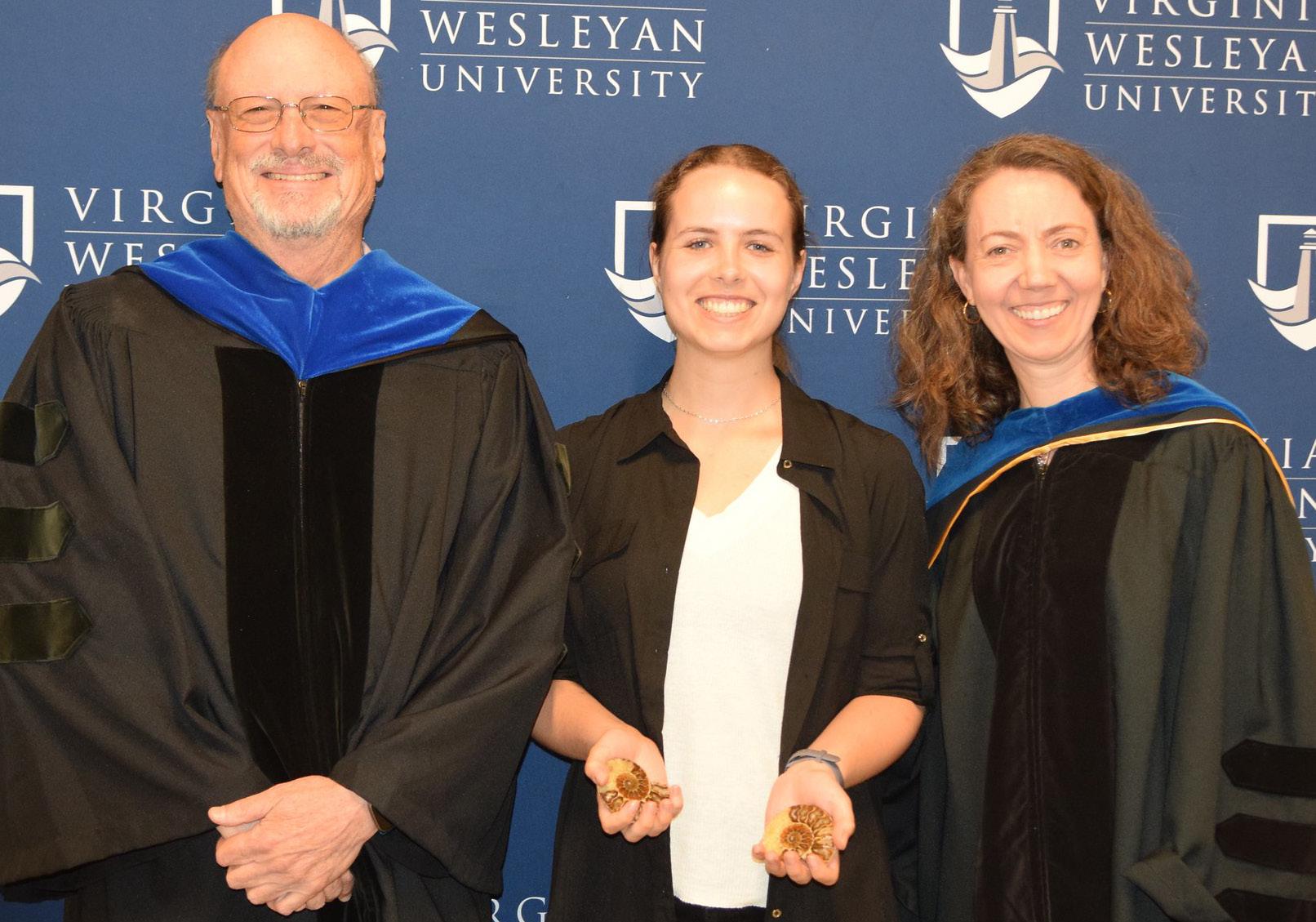
Neurodiversity Center aims to support equality -- Page 3
“Part of the ultimate goal is to increase workplace inclusion [and] increase employment rates for neurodivergent people.” -Author Jules Edwards
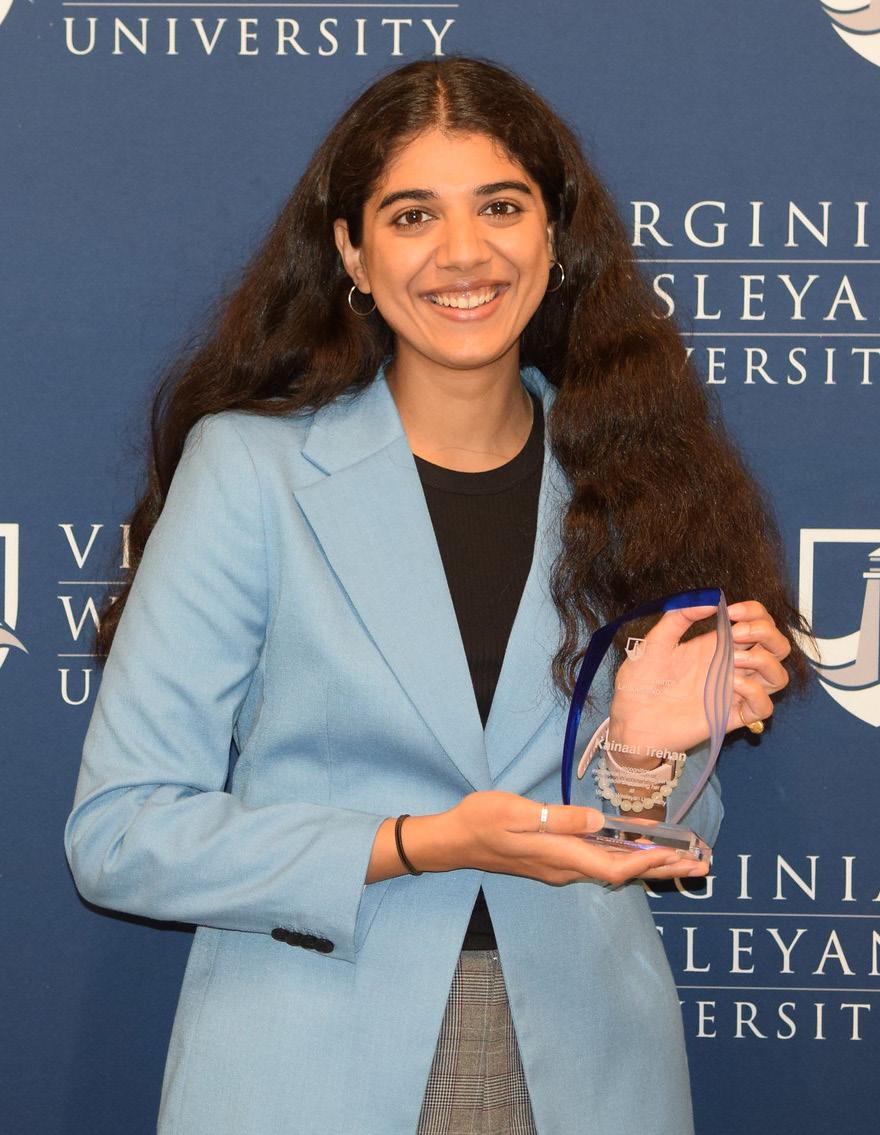
SGA elects new officers -- Page 4
“We can all benefit from each other and show that we can just work together for the betterment of campus.” -- First-year and President-elect Miles Pifer

Juliette Coffey secures first ODAC title in Women’s Golf -- Page 8
“For her to accomplish this success in just her first year at VWU is incredible.” -Director of Men’s and Women’s Golf Tom Hall
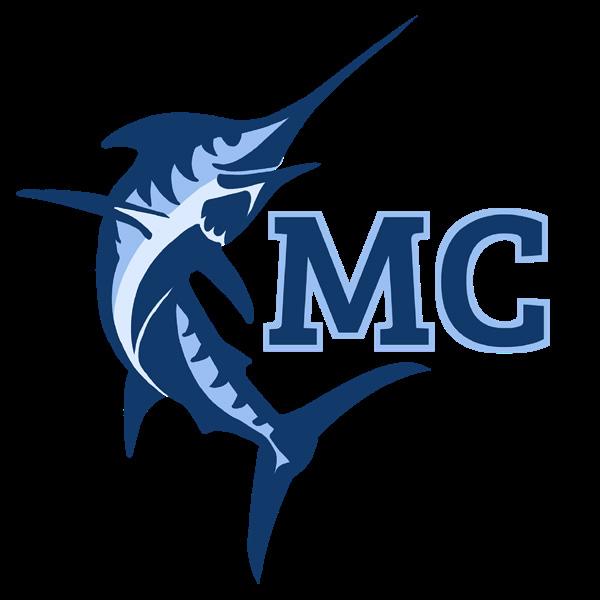
Following the Methodist church’s removal of a ban on LGBT clergy, as well as mandatory penalties for gay marriage, Miller looks forward to a continued partnership.
BY LILY RESLINK lbreslink@vwu.eduIn response to the United Methodist Church (UMC) repealing a ban on LGBT clergy, President Scott D. Miller chose not to disaffiliate with the UMC. Miller brought attention to the decision via email on May 1.
“In a historic vote today at the United Methodist Church General Conference, held in Charlotte, North Carolina, the church delegates voted 692-51, repealing a 40-year ban on LGBTQ clergy. The vote also removed mandatory penalties for performing same-sex marriages, bans on LGBTQ candidates for ministry, and bans on funding for gay-friendly ministries,” Miller wrote.
Had there been a different outcome, Miller said that the university would have considered initiating the disaffiliation process.
With many direct ties to the Methodist leadership, Miller frequently communicates with those involved in decisions as influential as legislation and policy. “I told them this was the year that we were going to decide, and if they didn’t change, we were going to drop them,” Miller said.
However, given the results of the conference, Miller said that he looks forward to continuing the affiliation. “The changes satisfy our requirement to stay affiliated with the United Methodist Church,” he said.
Miller pointed to the changes experienced by the UMC and acknowledged the greater good of them. “The end result is a United Methodist Church that is smaller and less financially affluent than before, but which represents those ideals that we consider to be the most important,” he said.
Miller emphasized the significance of the vote. “As a lifelong Methodist, as a graduate of the United Methodist institution, as now the president of three institutions that have had historical relations with the United Methodist Church, the changes that were approved delight me, and I think that the future for Virginia Wesleyan with the United Methodist Church as a partner is bright as a result of these changes,” he said.
Miller has been consistently vocal about human rights, including the three-year period he occupied the role of President of the National Association of Schools, Colleges, and Universities of the United Methodist Church (NASCUMC).
An article from the UMC’s “Higher Education & Ministry” website page published on Jan. 6, 2020, quoted Miller: “For United Methodist-related educational institutions, it’s also a vital step. It would foster the kind of inclusive community in our churches that we already respect and

value on our campuses.”
Miller has also enacted this advocacy on campus, notably when a previous vote retained LGBTQ exclusions. “We protested that by taking down the United Methodist flag,” Miller said.
“The debate over LGBTQ rights in the United Methodist Church has been going on in some form for the last half century, and Virginia Wesleyan applauds the Church for finally choosing the path of inclusion. Today, we are especially proud of our United Methodist heritage and look forward to a brighter future for the Church and its people,” Miller said in a May 1 email.
Dr. Craig Wansink, the director of the Robert Nusbaum Center and chair of Religious Studies, spoke on how the landslide votes in favor of repealing the LGBTQ-targeted bans indicate the direction the Methodist Church is moving.
Wansink made the point that affiliation with an organization comes with constant assessment of the messages that it represents. “If you’re a part of any organization, an ongoing question is: If the organization has a policy that you disagree with, because an organization has many policies, at what point do you say, ‘Well, this is my opportunity to change from within?’ Or at what point do you say, ‘It’s just time for me to leave because I don’t want to be associated with this?’” Wansink said.
This identity-related turmoil sought resolution at the recent conference. As explained in Miller’s May 6 Nota Bene email, the UMC holds a conference every four years for delegates to convene and “decide on doctrine, governance, and other issues within the denomination.”
After a delay from COVID-19, the discussions for this year’s conference have had four extra years to accumulate.
The decisions from this conference reflect topics pertinent to modern life.
According to an analysis by The Rev. Taylor W. Burton Edwards from the UMC website, Methodist leadership proposed legislation that allows churches to leave the United Methodist Church if they’re upset by discussions and decisions made about human sexuality at the 2024 General Conference.
As an elaboration on the changes this conference sparked, an AP article stated, “Without debate, General Conference has removed The United Methodist Church’s ban on the ordination of clergy who are ‘self-avowed practicing homosexuals’—a prohibition that dates to 1984.”
Wansink offered a perspective on the impact of intertwining religious and personal identities. “It has been a confusing and disorienting time within the Methodist Church, …people on both sides of the issue have had to stand up for what they see as their identity and what the identity of the Methodist Church should be,” Wansink said.
Miller echoed this sentiment as he reflected on the institution’s history. “In 2017, when we moved from being Virginia Wesleyan College in Norfolk to being Virginia Wesleyan University in Virginia Beach, our corporate governance documents were reviewed at that time also,” Miller said.
This marked the shift to a relationship with the UMC defined more by historical ties than religious ones. Miller continued, and said that due to uncertainty about the UMC’s future, “...those documents
Art museum relocates to campus, offers opportunitiesBY GABRIELLE BARNETT gabarnett@vwu.edu
Expectations vary for the new Virginia Museum of Contemporary Art (MOCA) building’s expected installation on the Virginia Wesleyan campus.
The MOCA announced in July 2023 that it would be creating a new, modern facility built on VWU’s campus. This new facility will replace the MOCA’s current location on the Virginia Beach oceanfront and will offer space for a wide range of art experiences to students and members of the community.
“Our collaboration with VWU will allow us to do even more of what we do best: create groundbreaking exhibitions and engage the community in thought-provoking artistic experiences,” CEO and Director of MOCA Gray Ryan said in the July press release.
The MOCA facility will provide new spaces for the arts at VWU, including the Artlab. The building will also function as a classroom, according to a press release in March 2024. It will allow for both educational and exhibitional space for all art students.
“I can envision this endeavor providing students with opportunities ranging from class tours of the facility to specialized paper topics, guest speakers, guest artists, short visits and long-term
residencies, opportunities to work with area school populations that will visit MOCA, and beyond,”
Dr. Sally Shedd, the incoming Dean of the Susan S. Goode School of Arts and Humanities, said. Shedd serves as a Professor of Theatre, the Chair of the Department of Political Science and a member of the VWU/ MOCA Integration Team.
Shedd explained that some decisions on the project are still underway, and she expressed enthusiasm about its implementation. Shedd said that the facility would bring opportunities to students of all majors.
The press release in July said that the creation of this new facility will be funded by the donations of Jane Batten, Joan Brock, and Susan and David Goode. The philanthropists are all long-time financial supporters of both VWU and MOCA and will be a crucial part of funding the new facility.
Liam Castellano, a first-year Media and Communication major with a Theatre minor, expressed their interest in the new building.
“I think it’ll be great for Virginia Wesleyan students to have such easy access to these new artistic spaces, and it’ll really bring Virginia Wesleyan to a new level on a national scale,” Castellano said.
Senior Art major Jomaira
Rosado said that the facility would help bolster the department.
“It could potentially bring inspiring artists or people from Virginia Wesleyan to go and put their stuff in there,” Rosado said.
Despite the potential it has to provide student opportunities, Castellano expressed concerns about the location of the new building. The MOCA facility will be located near the Goode Center and Beverly Hall, and will replace part of the parking lot. Castellano is a commuter student who regularly parks in this parking lot. They explained that while the parking lot is typically about half-full, events tend to quickly fill it up. With the new MOCA facility bringing more visitors and possibly more students to campus, Castellano expressed logistical concerns.
Castellano’s concerns referenced the housing troubles that VWU has had in the past few years, causing some students to be placed in off-campus housing in hotels. “We need more housing already,” Castellano said. “So, I don’t think the solution is to just revamp existing housing. We need more housing and more parking for more people.”
The arts affinity housing in Eggleston Commons in Bray Village, referenced by President Scott D. Miller as part of the David R. Goode Arts Complex, will hopefully aid in these
were changed to essentially make us an independent institution that had a historical relationship with the church rather than the church having any say over policy or curriculum or social activities on campus.”
Miller emphasized the importance of remaining independent from church influence at a time when its values were still up in the air. “We didn’t want them to be dictating anything that we disagreed with,” he said.
As it stands, Miller expressed contentment with the university’s current status and religious partnerships. He pointed to Haygood United Methodist Church (HUMC) and the opportunities created through its affiliation with Campus Ministries. “With Haygood as our active partners, it’s a cost-effective way to recognize our history with like minded partners, and to provide our students who are interested in the ministry to be involved in a church that thinks like we do,” Miller said.
Campus Ministries operates under the leadership of Marie Porter, director of Student Ministries, who is also a member of HUMC. Senior Amaris Nolan, a member of Campus Ministries, said she thinks the school’s Methodist affiliation adds to the university’s inclusivity, especially with Porter as a support for students.
“As someone who works with campus ministries and has seen the way Marie works to create a safe and loving environment for everyone, I believe that their presence on campus is a benefit,” Nolan said.
For Miller, this subject resonates deeply as an individual and a professional. “I’m a lifelong Methodist. We [VWU] were founded in 1961 by the United Methodist Church. We are proud of that historical relationship, even during tough times,” Miller said.
According to Miller, this portion of the institution’s identity should not be brushed aside or disregarded. “There’s no shaking the fact that they were our historical partners. We were together through thick and thin during these last few years,” Miller said.
Miller continued, “While our relationship with Haygood has grown and been strengthened, we have, to a certain extent, paused our relationship with the national church, while the national church has searched for and resolved their issues that we consider to be inconsistent with our mission and purpose.”
Although disaffiliation was not necessary, Miller solidified the school’s determination to remain prepared to act in alignment with values of inclusion and maintain affiliations with organizations that reflect its mission.
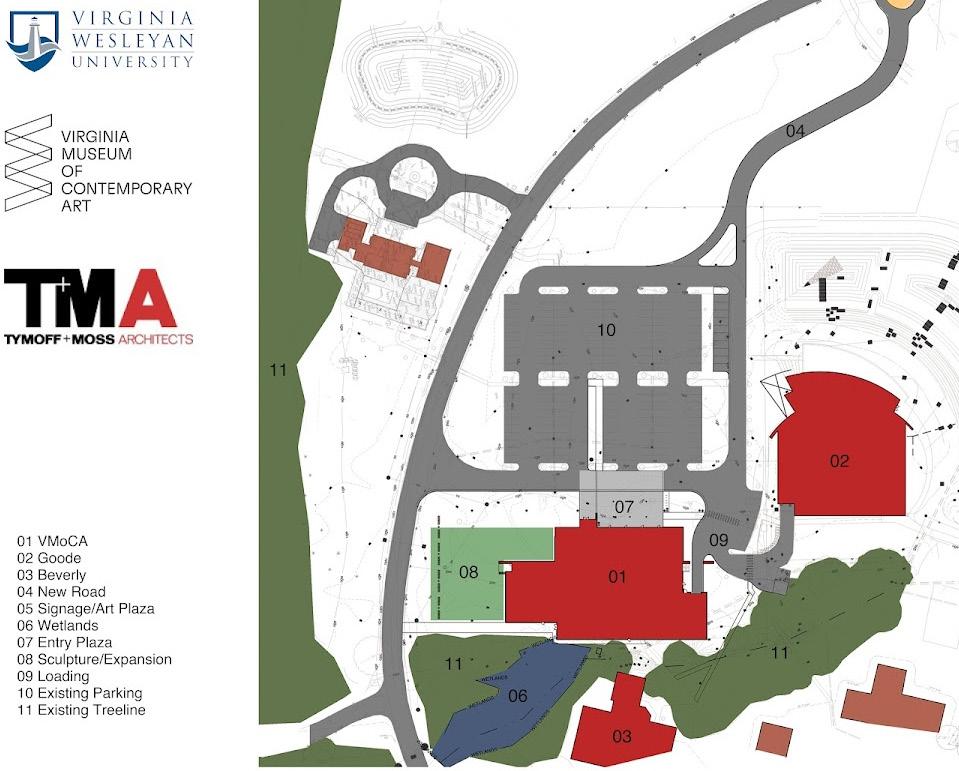

housing problems, as well as strengthen the support of the fine arts community on campus.
As for the parking, Shedd spoke about the problems faced with parking during the building of the Goode Center and said that she parked in other places then.
“I’m willing to park anywhere on this campus with a smile in order to achieve this kind of growth and community engagement for VWU,” Shedd said. She added that one of the benefits of a small campus is being able to walk to locations, even if there isn’t easily accessible parking. Rosado ultimately expressed optimism toward the new
opportunities that the facility would bring for Art majors.
She said that it could aid in advertising for events and exhibitions, as well as allow for more opportunities for Art majors hoping to join the professional realm.
“For it to be the MOCA, that could bring in a lot of revenue for other artists, other seniors, and they can possibly go somewhere rather than just being stuck at just having a bachelor’s degree,” Rosado said. No matter what expectations the facility upholds, it will certainly have an impact on the campus.
The continual development of campus partnerships sheds light on the value of extending the reach of Virginia Wesleyan.
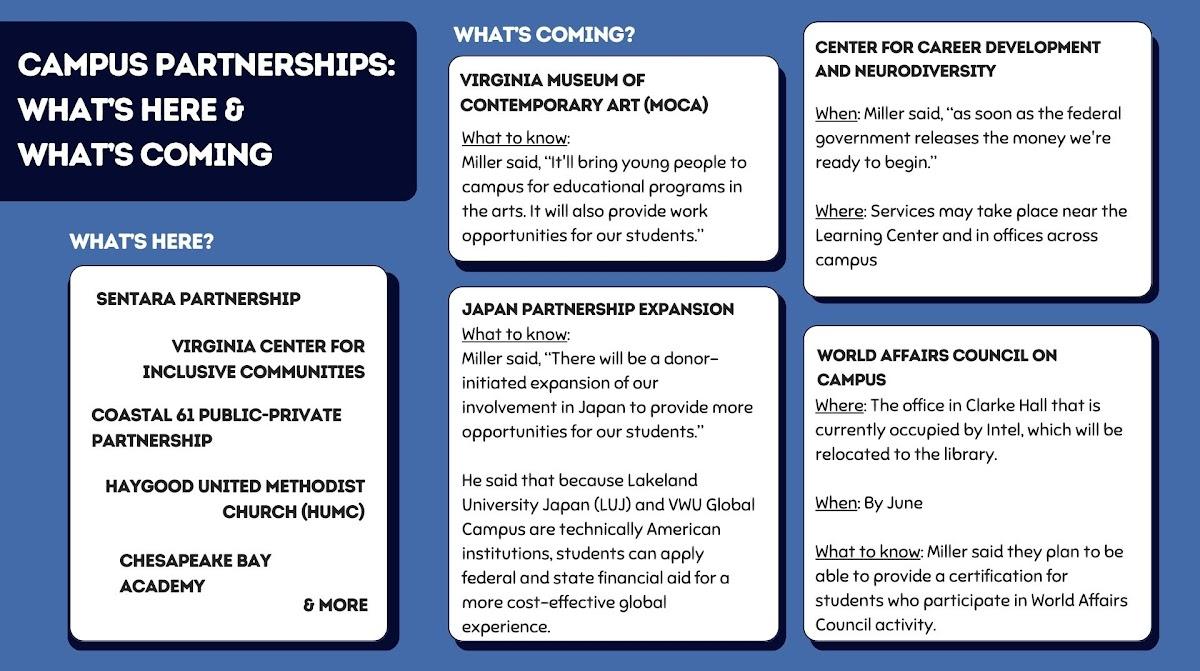
“It used to be that college presidents would say to faculty, 'it’s publish or perish.' I've been a college president for 34 years, and that trend has changed. I say, partner or perish. And by that I mean that like-minded organizations, when partnering, strengthen both organizations.”
President Scott D. MillerVirginia Wesleyan will be establishing a Center for Career Development and Neurodiversity on campus.
The center is made possible by a $625,000 grant, proposed by Jules Edwards and Meghan Ashburn, co-authors of “I Will Die On This Hill: Autistic Adults, Autism Parents, and the Children Who Deserve a Better World.”
According to a VWU press release, “The center aims to empower participants to transition successfully into the workforce.”
Edwards added her view of the center’s mission. “Part of the ultimate goal is to increase workplace inclusion [and] increase employment rates for neurodivergent people,” she said. “So often neurodivergent kids are excluded. I’m sure there’s other programs that are segregated and especially for disabled people, autistic or neurodivergent. But that’s not inclusive; that’s not going to get somebody where they want to be in their career necessarily.”
Her motivation behind the proposal of the center was inspired by her experience with neurodiversity. “I’m a parent of autistic people, and I am autistic myself and I struggled in higher education,” Edwards said. “I needed support that didn’t necessarily exist at the time, but I also wasn’t able to identify what support that I needed.”
In addition to this, Edwards said that her motivation is so that, “not only my children, but everybody else’s kid and every other kid who doesn’t even necessarily have a family to fight for them, can get what they need.”
David Black, chancellor of Virginia Wesleyan’s Global Campus, assisted in writing the grant application. He explained his motivation for the project.
“The successful stories at VWU with increasing community members who are autistic convinced us that we should increase services proportionally to the increase,” Black said.
Black elaborated on the plan for the center. “What we are calling a ‘center’ will actually be a number of support services distributed across campus, in offcampus courses and at internship locations,” he said.
As far as services on campus with the center, it “would likely
add about five additional autistic students in entering classes on campus,” Black said.
Edwards explained that with this center, it is expected that neurotypical students will benefit just as much, enhancing an inclusive learning environment.
“Neurotypical students and abled students lose out by the exclusion of disabled students when disabled students are pushed into segregated classrooms, selfcontained classrooms,” she said. Without an inclusive learning environment, Edwards added that “the neurotypical students lose the opportunity to learn that there are other ways of existing.
Ashburn said that in the future, the goals of the center will hopefully continue. “We want to continue the work of the center at Virginia Wesleyan. So hopefully this will be an ongoing project,” Ashburn said. “And then we’ll be partnering with other universities and sharing what we’ve learned and inspire them to do the same type of work.”
Black echoed this prospect.
“The soil here is so humane that building on existing strengths and culture will end up as an example to other universities, all of which enroll students who are autistic and can benefit from support while preparing for productive lives after college,”
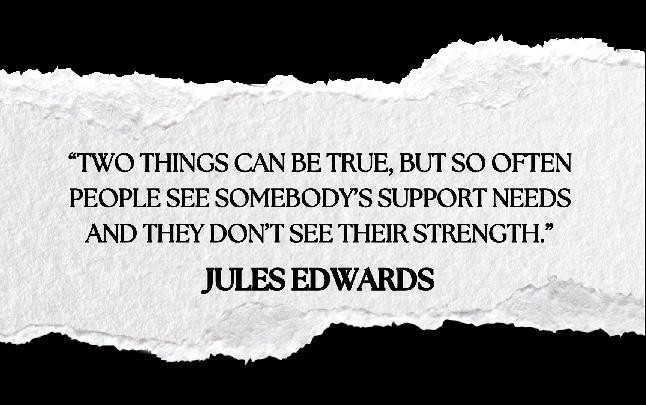
how to be anti-ableist. They don’t have that opportunity.”
Senior and President of the Disabled Students Union Oliver Chauncey provided his view on the center. “I think that being able to cater specifically to neurodivergent needs is going to vastly help neurodivergent students, because the timing is different in high school— you’re going from a completely structured environment to an unstructured one,” Chauncey said.
Ashburn mentioned that she has seen similar work done at other universities. “Jules and I have attended several workshops and conferences with these universities that they think they are paving the way in terms of accessibility, and the things that we heard in those workshops is that it’s like, the bare minimum,”
Ashburn said.
She explained that VWU already carries out what these other universities are attempting.
“It’s things that Virginia Wesleyan does organically for all of their kids, not for neurodivergent kids, but for all of their kids,” Ashburn said.
Ashburn believes that the center should be a model for other universities to follow. “We want to inspire other universities,” she said.
Edwards highlighted the value of Virginia Wesleyan University including neurodivergent individuals in the planning of the center. “A lot of those programs were designed by academics and people who have studied disability, but not necessarily disabled people themselves or neurodivergent people themselves,” she said.
Chauncey believes that every school should have similar resources. “I think this goes beyond what the ADA [American Disabilities Act] requires,” Chauncey said. “I’ve always viewed the ADA as base ground requirements and the fact that the school is going beyond what is necessary here to help students really shows how much they care about us and really shows innovation I think. I think other schools are going to be following suit.”
Chauncey elaborated on the integration of neurodivergent students utilizing the center. “I think that it’s going to be a really good step in integrating them into our college community,” he said. In the words of Edwards, “Two things can be true, but so often people see somebody’s support needs and they don’t see their strength.” The center will push to support students in allowing their strengths to shine.

Sentara Healthcare and its subsidiaries are currently under investigation for potentially misleading regulators in Virginia to increase their plans to higher prices during 2018-2019. The key point of the investigation is Sentara Health Plans, which was known at the time as Optima Health. Sentara Healthcare faces an accusation by the Department of Justice that they falsely made claims for premium tax credits to the U.S. while raising premiums for customers, violating the False Claims Act.
The alleged behavior occurred during a time in which Sentara Healthcare did not have much competition in the market and had the ability to control pricing by raising their premiums, since customers may not have had many other options.
The changes in pricing were not minor; individual plans were raised by an average of 81.8% in 2018 compared to 2017. Depending on where citizens lived, some increases were as high as 265.5%, according to WAVY, a local news source.
The Virginian-Pilot reported on Ian Dixon’s case as an example of these spiked premiums. His family’s premium went from $988 a month to $3,158 a month.
The increase in these premium prices can be difficult to monitor, especially for younger people getting their feet wet in becoming more responsible with healthcare and other issues.
Sentara said that “policymakers in Washington destabilized health insurance markets,” and the raised prices were a result of that.
“After hearing about Sentara spiking their prices, I went back to check my statements to make sure that I was not overcharged for any of my copays,” senior
Biochemistry major Sandra Abdellah said.
The investigation itself does not involve copays, but Abdellah is suspicious of what other prices Sentara and other hospitals raise. The case has created some controversy as to whether these hospitals are meant to make money first or help patients first.
“Raising insurance policies leaves people with no choice but to pay up,” Abdellah said.
According to WAVY, Sentara earned more than $535 million in federal subsidies the same year. Sentara has continued to deny these claims of overcharging clients and said that they plan to continue working with investigators to make things right.
The Atlanta JournalConstitution reported that a fifth of U.S. hospitals have been warned about secretly increasing pricing.
Abdellah will continue to personally monitor the situation, especially after reading what Sentara Spokesperson Mike Kafka said to the public.
“I read the statement, and it appeared to me like a lot of excuses and not much explanation. I will definitely be double-checking the charges before I swipe my card for a doctor’s appointment,” Abdellah said.
The Daily Progress reported that Kafka said their rates were approved by the Virginia Bureau of Insurance and the Centers for Medicaid and Medicare Services. In his statement to the public, Kafka said, “These rates were verified by a leading independent actuarial firm and approved twice by Virginia regulators.”
Sentara, in an official statement, said, “As it has for nearly three years, Sentara will continue to operate in good faith and looks forward to a resolution of this matter.” Sentara denied all accusations.
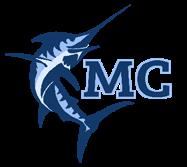
Editor-in-Chief
Rhian Tramontana rjtramontana@vwu.edu
Managing Editor
Carey Seay clseay@vwu.edu
News Editor
Lily Reslink lbreslink@vwu.edu
Community Editors
Victoria Haneline vfhaneline1@vwu.edu
Carey Seay clseay@vwu.edu
Opinions Editors
Kara Hopkins knhopkins@vwu.edu
Madelyn Yale mgyale@vwu.edu
Sports Editor
Colette Kearney cmkearney@vwu.edu
Sydnee Washington sawashington2@vwu.edu
Weekender Editors
Calee Lukowski crlukowski@vwu.edu
Sasha Saxon ansaxon@vwu.edu
Illustrations Editor
Hailey Benders hjbenders1@vwu.edu
Online Editor
Josue Maradiaga jmmaradiaga@vwu.edu
Copy Editor
Kirkland Butler kwbutler@vwu.edu
MK Morris Larkin mmorrislarkin@vwu.edu
Engagement Editors
Chloe Booher crbooher@vwu.edu
Mars Johnson ibjohnson@vwu.edu
Marketing Directors
Emily Moody egmoody@vwu.edu
Advisor
Dr. Lisa Lyon Payne lpayne@vwu.edu
First-year Miles Pifer was elected as the next SGA president.BY JENNIFER MEJIA jpmejia@vwu.edu
As the final ballots are tallied and the anticipation reaches its peak, the Student Government Association (SGA) comes to the conclusion of its new representative election for the 2024-2025 academic year.
“We have passionate leadership that has experience but is new to the organization, so I think it’ll be different this year, but I’m excited to see what comes out of it,” current SGA President and senior Eddie McDonald said.
On April 25, the results from the elections were released. The newly elected members of SGA for the 2024 through 2025 academic year consist of: sophomore senators Erin Beaudry, Gabrielle Barnett, Lucas Gordon and Ava Ruggiero; junior senators Shortbed Bowden, Joy Ramsey, Kaza Dayton and Isaac Awogboro; senior senators Comfort Tambaya, Daryl Tucker, Abby Moyers and Veronika Murphy.
Gordon, who represented the first-year class over the 2023-2024 school year, was pleased with the increase of student involvement in the election.
“You know, I was definitely excited to see that I had been reelected. I know in the original election cycle for our freshman senators, there wasn’t that much representation—this past election cycle was just really exciting to see all the new faces on the ballot,”
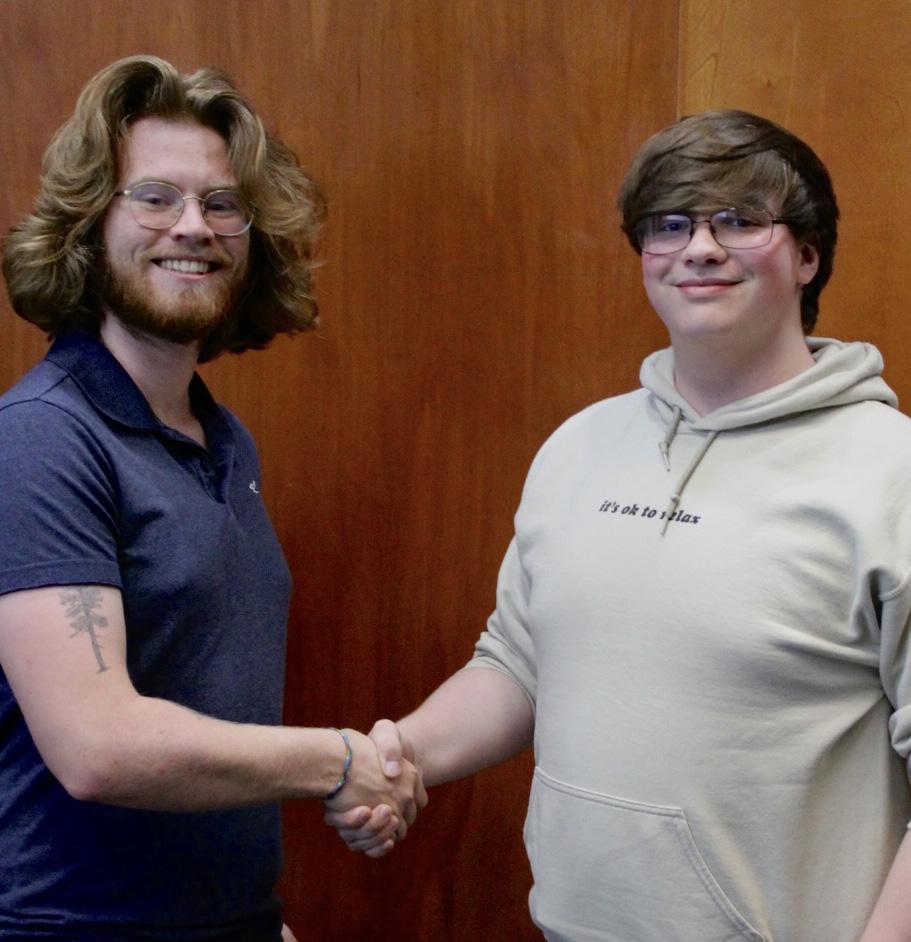
Gordon said. For the 2024-2025 academic year, Miles Pifer, a first-year, and Christopher Mercer-Garrett, also a first-year, have both been elected into important positions of student leadership. Pifer was elected president and Mercer-Garrett was elected vice president. With the conclusion of the recent elections, Pifer and Mercer-
Garrett, as well as the formidable student senate, have emerged to steer our campus community towards a brighter future.
Taking on the role of president, Pifer looks forward to leading the student body through collaboration.
“The communication hasn’t been the best it can be, so I want to increase that communication,
increase the openness, the drive that not just some but all students have to speak with their senators and speak with staff and faculty to address issues that happen on campus that students talk about,” Pifer said. “Broadening campus as a whole and kind of having this umbrella that surrounds campus and all the organizations that we all fit under, we can all benefit from each other and show that we can just work together for the betterment of campus.”
Mercer-Garrett echoed this sentiment, and emphasized the importance of all student voices being heard.
“There are a lot of BHC students that are involved in SGA, and I think that turns people away. And I’m not saying that to be derogatory, but I think that turns people away. I think for me coming in as a freshman I can definitely be an advocate for everyone, regardless of whether they are BHC or not BHC,” Mercer-Garrett said. “I think that’s going to be the only way we’re going to really be able to have more participation on campus.”
With the inauguration of the newly elected members of SGA, a new chapter unfolds—one marked by collaboration, inclusivity and progress. Together, students have the power to shape the landscape of the Marlin community, to ensure that every voice is heard and every perspective valued.
On Sunday, April 21, GreenFest, an Earth Day inspired festival headed by Dominion Energy, the VWU Sustainability Council and Marlins Go Green, saw blooming success. Tables and events lined the halls of the Jane P. Batten Student Center and spilled into the CMAC, as presenters from local businesses and organizations offered insights to keeping the community green in a variety of ways.
From a clothing swap and pea-planting to cotton candy and a bounce house, GreenFest had something for everyone. Locals came together to create an event that brought together the VWU community as well as surrounding participants from the Virginia Beach and Norfolk areas.
VWU has been committed to sustainability in various ways for many years. With the creation of the Environmental Sustainability Council (ESC) over 10 years ago, there are intentional actions taken campus-wide to keep the Marlin community on track.
“I think it reflects the institution’s commitment to the environment, and the different things that we’re doing to promote environmental sustainability in our classes as well as through these extracurricular things,” Dr. Maynard Schaus, professor of Biology and Environmental Science, director of Accreditation, coordinator of Sustainability Management and member of ESC, said. During GreenFest, Schaus gave away trees to be planted at home and spread the word about the Earth and Environmental Sciences department’s programs.
Along with creating school policies and practices, ESC works with groups on and off campus to organize events such as GreenFest. This year’s GreenFest hosted organizations that focus on sustainability and conservation. It served as an opportunity for students seeking jobs in the local community, and also as an educational opportunity.

“As
GreenFest brought fun in ways a true festival would, with cotton candy, popcorn and a bounce house. Many of the organizations and presenters in attendance also hosted interactive experiences such as a promotional recycling game station, potting and planting peas station, community art piece creativity station and marine life skeleton identification station. The event was originally meant to be outdoors, hosted alongside birdwatching and native plant gardening, but was moved indoors due to weather. Thankfully, in true Virginia Beach rain-resilience fashion, the event turnout was still high.
Representatives from the Virginia Aquarium and Marine Science Center were of the many organizations that attended the event.
“What we have recognized is that you usually only have about, on average, seven seconds with a person before they stop paying attention to you, and they want to move on to the next thing,” Community Engagement Coordinator
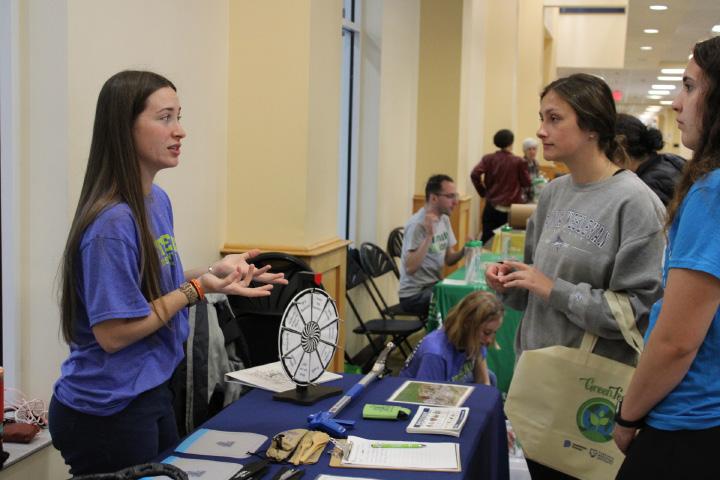
at the Virginia Aquarium Max Wright said. “So, what we do is try and combat those very natural human behaviors by creating activities and opportunities that are digestible in that short amount of time.”
Wright, along with other members of the Virginia Aquarium, hosted a biodegradable bird feeders examination station at GreenFest.
“While they’re [examining the feeders], we’re sharing information about the different parts of the bird feeder itself and why it’s directly impactful for those animals, and then what those animals are doing for the environment around us, and why we want to support them,” Wright said. “As those interactions are happening, we’re filling them with information at the same time, and because they’re also engaging other senses, they’re able to absorb it and digest it a little bit more because they’re physically moving and hearing the information at the same time.”
Wright said those who visit the aquarium tend to be more engaged than those at events such as GreenFest, so these interactions are really just the first step in a visitor’s environmental education.
Keeping education interactive is especially valuable for young children, but is important for everyone. Hands-on learning increases relevance and generally fosters appropriate care and concern for a cause. Without a connection to conservation of the environment, people may look the other way. Without a foundation of scientific awareness for the world around us, it is more difficult to comprehensively get people in-the-know and impassioned.
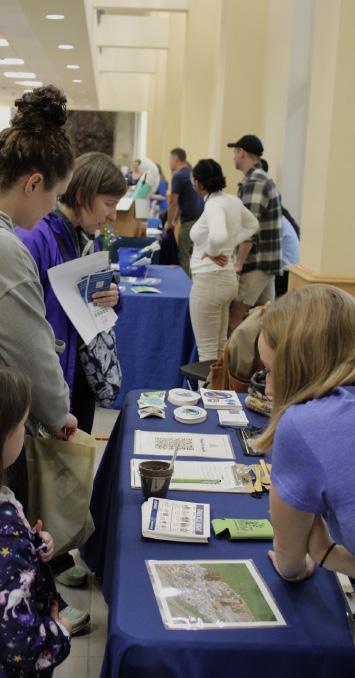
First-year Madeline Diaz spoke to the importance of environmental education in schools. Diaz, who plans to become an elementary teacher, was surprised by the amount of young participants at GreenFest. “I really did not think that there were going to be a lot of
Sophomore John Post has played as a villain in three out of four of VWU’s mainstage theater productions in the past two years.
BY VICTORIA HANELINE vfhaneline1@vwu.eduTo those students who like to see Virginia Wesleyan’s theater performances, John Post is likely a familiar face. They have been involved with the VWU theater for three years, first playing a rock in “Spongebob: The Musical.” Since then, they have played a part in all four mainstage productions, three of those being the antagonist.
“They tend to be the most fun, and some of the more challenging characters,” Post, a sophomore who is majoring in Theater, said. They have played DeVicious in “Airness”, the Nasty Interesting Man/ the Child in “Eurydice” and Gleb in “Anastasia.”
Although before coming to college, they had only played lighter, comedic productions, Post said they were learning to “appreciate the darker arts” since being cast as a villain. Post said Gleb was “one of the hardest things I’ve ever had to play, and also one of the most rewarding.”
“[Playing Gleb], it felt like there was a heavy weight on me—like I was wearing a weighted vest,” Post said. They said that the ability to kill for their beliefs, like Gleb had, was a heavy weight that they wore until the bows at the end of the night.
The willingness to kill isn’t just Gleb’s— Post described the Nasty Interesting Man as “lov[ing] a character so much they’re willing to kill her”—but still thought of him as a very different character from anything they’ve played before.
Post has been involved with 48 shows in both acting and directing roles. They’ve been involved with theater since they were playing at the Smithfield Little Theater at eight years old.
“Community theater is a great way
for young actors to get more experience outside of their schools,” Dr. Travis Malone, professor of Theatre and Anne B. Shumadine Dean of the Batten Honors College, said. Malone said that schools generally only do a few productions a year.
Senior Elias Kenworthy said Post was not happy about being typecast, but that it was “just the vibes,” using the word “vibe” to refer to Post’s general affect and appearance.
“There’s something about being a spindly little guy that just gives villain era,” Kenworthy said.
Malone said that it was not intentional
that Post had received so many of these roles.
“Casting is always done in context,” Malone said. He added that roles are chosen based on auditions and how to make the best cast. At the collegiate level, he said that there is also an element of attempting to see everyone in the cast improve.
Kenworthy said that Post’s skills fell in this area as well, being better at the acting aspect than singing. He said that Post would likely agree.
“I see acting as this fine skill—this craft that needs to be honed,” Post said. In addition, they said they saw themselves
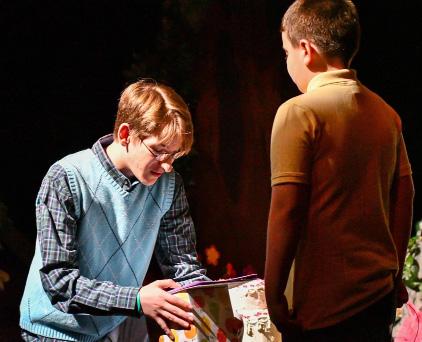
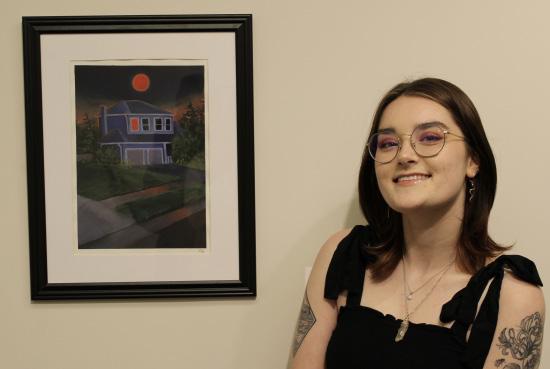
as an “actor, before a singer or a dancer.” According to Malone, Post had to work with a private voice instructor to meet some of the singing requirements for the part of Gleb.
Kenworthy wasn’t originally close with Post, but the two of them became friends during rehearsals for “Anastasia,” according to Kenworthy.
“We ended up going to this open mic night at the Zee,” Kenworthy said, and that he saw Post as more of a friend afterward.
“This is a great person,” Kenworthy said, noting that he felt comfortable around Post and that he didn’t have to hide who he was.
Post volunteers at the Smithfield Little Theater directing shows for younger students, the same place they performed as a child. Post directed a show their tenth year at Smithfield, and said that they enjoyed giving children better opportunities than they had.
“I want to try to give every kid in the theater [program] around here the best experience,” Post said.
Post said they will be graduating either a semester or a year early. They said they would miss performing in the area, as it takes a back seat to directing, as well as helping younger theater students, including those at the Smithfield Little Theater.
“It’s bittersweet, which is probably one of the most cliche things to say,” Post said. Their plan is to go to New York to pursue a performing career on Broadway.
“I want to do this for the rest of my life,” Post said. They want to perform in musicals like “Book of Mormon,” “Wicked” and “Anne Juliete.” They have already landed one major role, as Ebenezer Scrooge in “A Christmas Carol,” the musical based on the book, and have been involved in a production at Chrysler Hall.
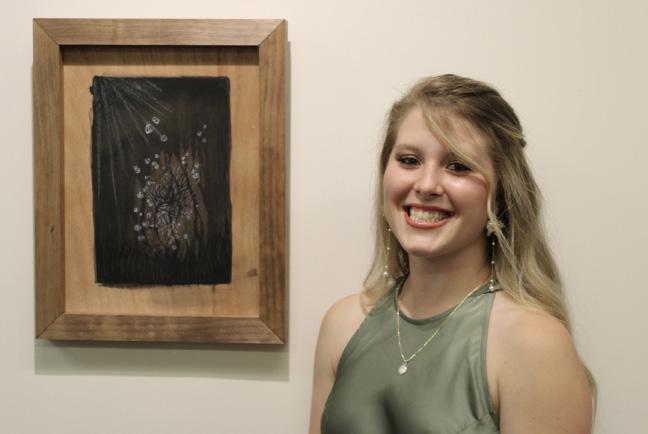
The Senior Art Show “Goin’ Through It” displays a collection of artwork from the ART 450: Senior Art Seminar course. Professor Philip Guilfoyle, director of Art and manager of Ceramics and Sculpture Studios, advised the class. “It’s actually a difficult class to teach because it’s not really straightforward. You have to work really individually with the students, so I really like that part of it,” Guilfoyle said. “They always go through an amazing kind of growth stage.”
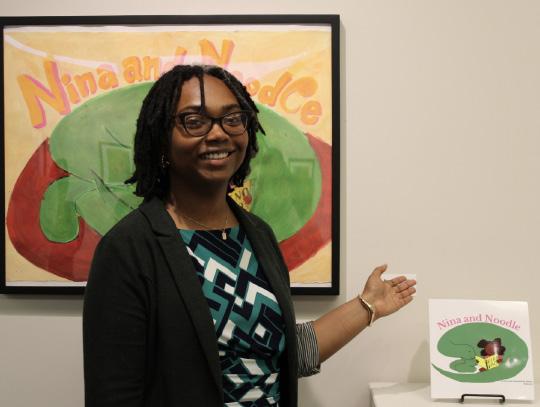
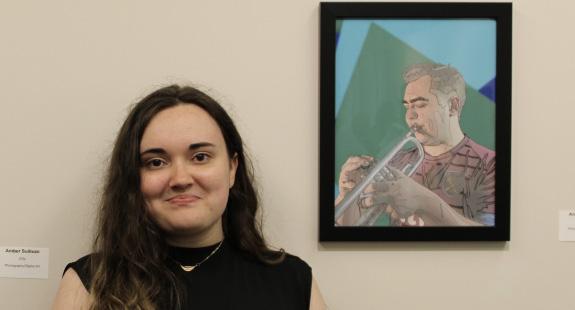
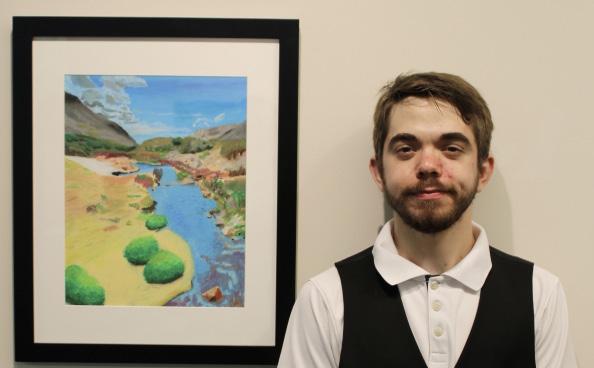
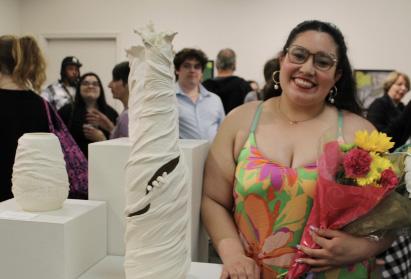
It’s that time of year again—students cram in hours of last minute studying and wind up getting brain numb in attempts to memorize as much information as possible.
Studying every waking second becomes the normal routine for the next few days hoping to get the ideal grade.
End-of-the-year testing, or in other words, standardized testing, has been a point of controversy for quite some time.
Through the years, students and staff have found themselves questioning the importance of benchmark testing and its significance for not only student progress, but also as an assessment for quality assurance.
Virginia Wesleyan University’s Biology department requires its graduating Biology students to take a two-hour long exam requiring students to answer questions to the best of their ability.
The hope with giving the test is to quantify data amongst the different subtopics within the field of Biology in order to get a better understanding of which sub-departments need more support in teaching students.
These efforts may have been innocent initially and geared towards allocating more support in order to improve future students’ scores. However, this exam is a serious disservice to the graduating classes who receive no benefits from this current testing method.
In my opinion, it would be more beneficial to replace the senior lecturebased test with a laboratory skill test.
Amongst the array of available 200-400 level classes required for Biology majors to complete, a majority of them demand an enrollment for a laboratory session in addition to the lecture times.
This section of laboratory time is an allotted time within the semester for students to learn and practice technical and psychomotor skills under the guidance of the professor.
With that being said, these valuable skills, necessary for future employment, are not made a priority at VWU and instead act as an accessory to the course.
Students interested in pursuing a Biology career need to be able to demonstrate their strong laboratory skills, making it just as important as proving that they have listened during lecture periods via standardized testing.
Laboratory positions typically require applicants to submit a curriculum vitae (CV) which normally provides a detailed overview of the applicants academic research and professional experiences.
Converting to a hands-on lab assessment would provide an opportunity for credible advisors, such as VWU science professors, to speak on the students’ strengths within the laboratory setting.
This would provide not only feedback, but support when finding employment positions that best fit the students strengths.
All in all, there is untapped potential in hands-on laboratory testing that could not only benefit the staff for quality assurance, but better prepare graduating Biology students for their careers in the field.
Madelyn Yale is a senior majoring in Biology. She enjoys going to the beach and spending her free time with friends. Madelyn can be reached at mgyale@vwu. edu.

Students were asked to reflect on the Academic Symposium and the balance between classes and presentations.
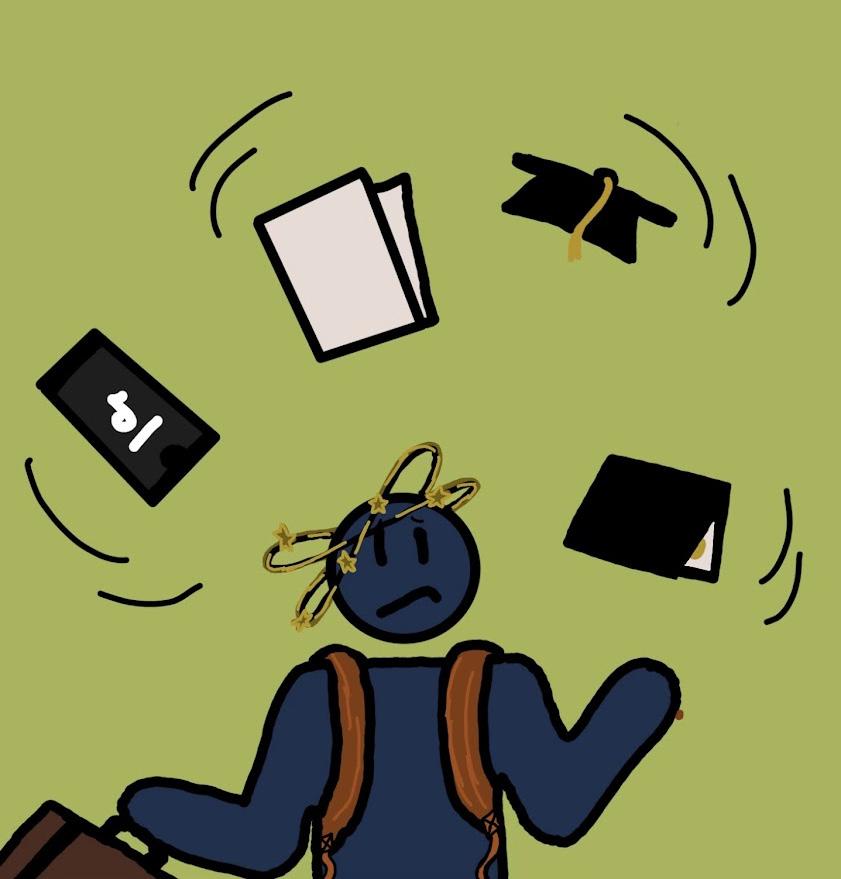
“I do not think that it is fair for students to have class on Academic Symposium day. This should be a day for supporting students and overall a day of learning. Students should have every opportunity to see academic achievements of the campus.”
Joshua Spicer ‘24
“I believe there should not be class on the day of Academic Symposium during the fall and spring semesters. Students who are expected to present or contribute to the event should be given grace to prepare for such an event that represents their hard work and dedication.
The Academic Symposium should not be hindered by distractions of any kind.”
Sydney McDonald ‘26
“If they want to support students’ academic endeavors, they should actually give them the time to do so. I haven’t always been able to support my friends and see what they have been working on because of classes being held during presentation times.”
Evelyn Weaver ‘25
“The Academic Symposium serves as a platform to highlight student achievements and research endeavors. However, scheduling classes during symposium presentations limits students’ opportunities to engage with and learn from their peers, detracting from the direct benefits of the symposium. Optimal scheduling that allows students to fully participate in and benefit from the symposium experience is essential to fostering a vibrant academic community.”
Emma Wehr ‘25
To our readers, Thank you, for your unending support.
As student journalists, we have the opportunity to make your voices heard, and we have loved every second. It’s an honor and a privilege to be able to write for you. As our final wish, we ask that you continue to take papers from the stands and read stories online. For you, The Marlin Chronicle may just be another piece of paper, but for us, it is a passion. It is a labor of love.
Not a day goes by where we are not grateful for the impact that The Marlin Chronicle has on individual lives and the campus community. The team is the definition of inspiration and growth, and every day they give us something to be proud of. It is not an overstatement to say that the paper has changed lives.
We can’t talk about changing lives without mentioning Dr. Payne, the advisor for The Marlin Chronicle. She is, in every way, the touchstone of the program. From simple edits to life advice, Dr. Payne leads us with immense grace. She holds us together and lifts us up. Through her, The Marlin Chronicle is able to be a place of strength. The newsroom has become a home for us and everyone on the team, and Dr. Payne deserves unending credit for creating that welcoming space.
To those who fill that space with joy and laughter, The Marlin Chronicle team, we are forever grateful. Through late deadline nights, last minute interviews and edit after edit, you continue to put your all into every single paper, and your dedication to The Marlin Chronicle
doesn’t go unnoticed. Your hard work is what encourages us to lead you with the same enthusiasm and inspires us to be the best versions of ourselves every day.
As we move on to the next chapter, we encourage you to continue entering the newsroom with the same devotion you have shown us. Continue sharing your passion for The Marlin Chronicle with the Marlin community, and with those
who extend our community. We will undoubtedly miss the friendships we have formed with each and every one of you, but we know you will continue to make us proud. We can’t wait to continue watching you succeed. Know that we will always be cheering you on from afar.
Thank you to the ends of the earth, Rhian and Carey
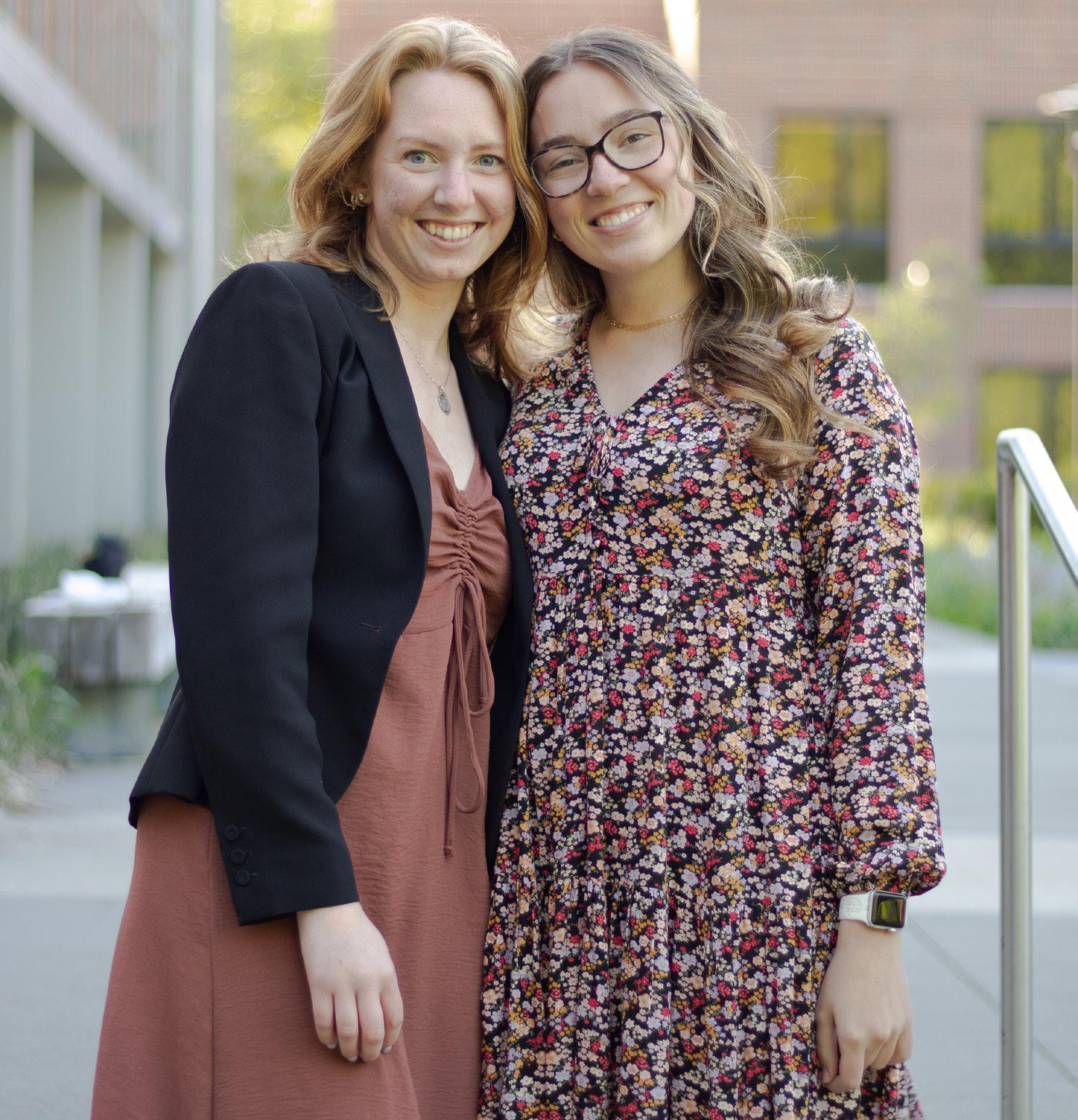
The Women’s Basketball team, once a powerhouse in their conference, has recently faced a string of challenges that have led to a period of rebuilding. The team has encountered difficulties in maintaining their previous levels of success. However, there is a sense of determination and resilience as they strive to turn things around and reclaim their spot as contenders in the Old Dominion Athletic Conference (ODAC).
One of the primary factors contributing to the team’s recent struggles has been a series of personnel changes. Graduation and injuries have depleted the team’s roster of key players, which left gaps in both talent and experience.
Furthermore, coaching changes have added another layer of complexity to the team’s rebuilding efforts. With the team having two new head coaches since 2021, the Marlins have struggled to adjust to new coaching philosophies, strategies and expectations. This struggle has manifested in their losing record, winning only 13 games in the past three seasons.
Shortly after the 2023-2024 season ended, a third coaching change was announced, and Megan Green was hired as head
coach for the upcoming 20242025 season.
Prior to joining the staff, Green served as the assistant coach at Dickinson College in Carlisle, Pennsylvania. In her first year at Dickinson, the team achieved a 17-8 record, and the coaching staff earned Coaching Staff of the Year honors for the Centennial Conference. During her second year with the program, Green played a big role in leading the team to a 19 win season, the best program record since 2007. Green also had coaching stints with Castleton University in Vermont and the University of Mary Washington.
“My plans for this program start with getting to know the current student-athletes and meeting them where they are. We are in this together and our growth will happen when we buy in to trusting each other and understanding what commitment and accountability look like,” Green said. “I’ve had the opportunity to meet with everyone individually already, and the hunger is there. They have all told me how they plan to get better over the summer and for the upcoming seniors— to leave the program better than they found it. We want to (and we will) find the joy in the process of this journey.”
Not only is Green ready to handle the on-court issues, but, with the help of her captains, she’s
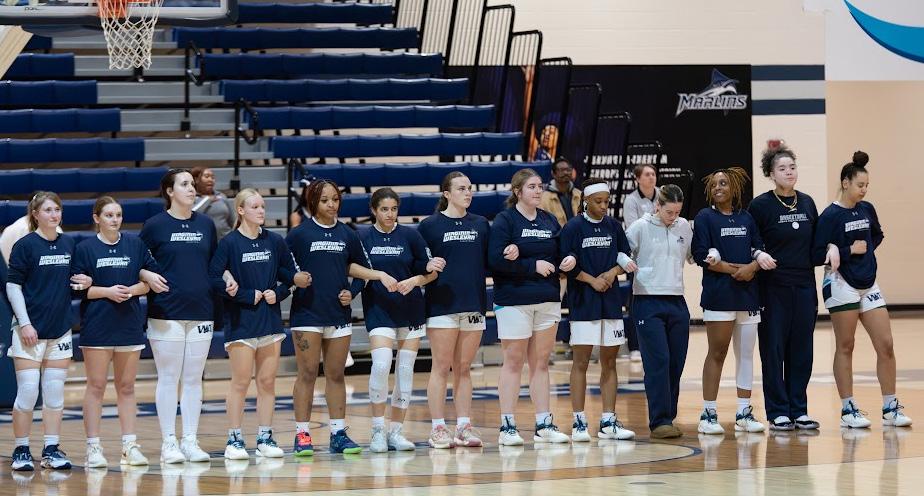
also ready to monitor the off-thecourt challenges that athletes have to face, such as academic demands and personal issues. Green is looking to give the team consistency— something that has been missing from the program for a long time.
“My approach will be to always be authentically myself. I will never waiver from my expectations, and I will always show every one of these young women how much I care about them as people,” Green said.
Jada Norman, a rising senior, has seen a lot of player and coach movement within her three years
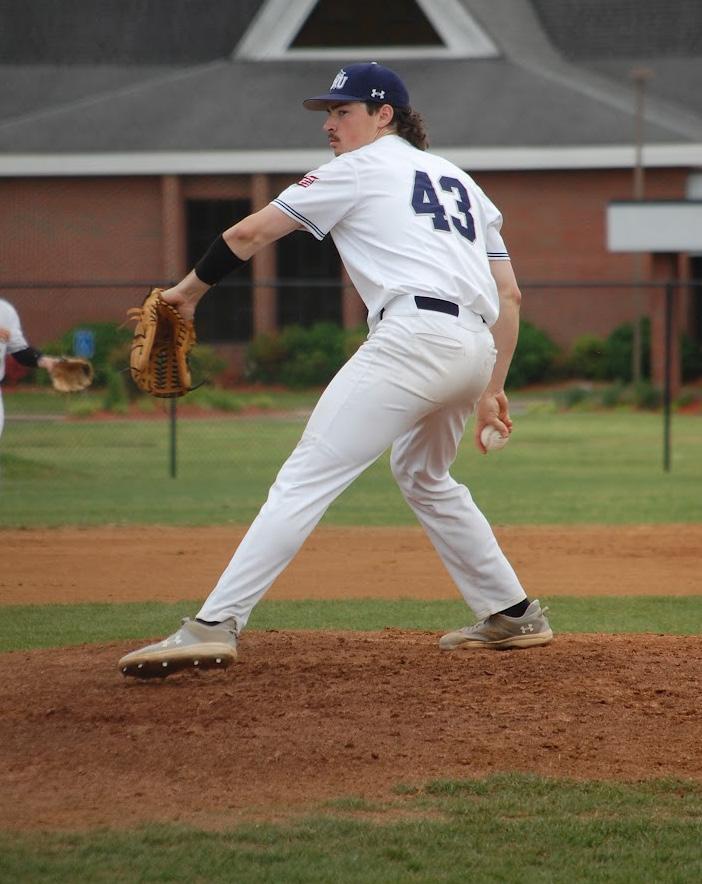
First-year Jack
BY SYDNEE WASHINGTON sawashington2@vwu.edupitches at a conference home game
27.
success, especially on the mound.
For the first time since 2019, Baseball has clinched a spot in the Old Dominion Athletic Conference (ODAC) tournament. They are seeded No. 7 with a conference record of 11-11 and an overall record of 20-17. This season for the Marlins was a dramatic turnaround from last season in which they totaled 5 wins and 30 losses.
Head Coach Chris Francis attributed the team’s improvement to its veteran leadership. “They brought in the young players, new players and they set a standard. And they’ve kept that up every day since the fall practices began, so I can’t thank or appreciate [enough] the work that they’ve done to really bring this thing along,” Francis said.
As a veteran leader, senior Samuel Kasprow defined his responsibility in such a role. “I’m always trying to help the younger guys out. If I feel like I know something that can help them in practice, I’ll start being a playercoach in a sense,” Kasprow said.
The young talent on this team has also played a part in their
“The biggest thing on the defensive side is we added 11 rookie pitchers, a couple of transfer sophomores, transfer freshmen and a bunch of freshmen who have contributed and really reshaped our pitching staff and our rotation. That’s what we’ve been missing since COVID,” Francis said.
This influx of talent has also alleviated the burdens of injuries the team experienced with key players, providing the team with much needed depth, according to Kasprow.
“I think part of the reason why we don’t necessarily think about [the loss of starting players] is because the guys who have stepped up have done such a great job of filling up those spots,” he said.
Although Baseball has had one of its best seasons since the COVID-19 pandemic, the team has had some inconsistency in performance this season. Francis acknowledged the shortcomings of the team that require addressing before competing in the ODAC tournament against top talent.
“I think defensively we’ve got to clean some things up.
We play well in spurts. We lost our starting shortstop Eddy Hardwood to injury and lost obviously Clay Clark, who was our corner outfielder, Marcel was another outfielder. So we’ve been sort of mixing and matching the last three or four weeks, and that seems to be sort of keeping us competitive. But I think that we just need to be more consistent defensively,” Francis said.
Nevertheless, the team remains confident leading up to ODACs, carried by the strength of their tight knit team culture, according to Kasprow.
“The one thing that’s been the most notable difference this year is the community and the brotherhood. I know that’s super cliche to say, but everyone is super connected,” Kasprow said.
Assistant Coach and Recruiting Coordinator Jeff Butler also commented on the team’s confidence despite postseason inexperience.
“I think our guys’ mindset is pretty clear, just being able to go out and compete every single day. They’re ready to take on whatever challenge, and they’ve proven that in these tough games,” Butler said. “They’re fighters, and they love it and they care, and that’s what’s going to take you deep, not just in the game of baseball but in life.”
Although the Marlins fell early in the tournament to No. 2 Roanoke, they show great promise, according to Francis.
“This past year’s recruiting class is one of the best ones we’ve had since I’ve been here. There are players that have been really developing and pushing that just haven’t had a chance to play yet,” he said. “But we’ve got a really good influx of talent that should be ready to contribute next year.”
Butler also showed excitement for the team’s young talent.
“From the get-go, just unselfishness. They’re just ready to go with what we’re ready to do, and they are ready to compete at a high level at any given moment. And their development is going to be key for us moving forward,” he said.
The next step for the Marlins in perpetuating this success for future seasons is cleaning up the defensive end, continuing to build upon their depth and preserving the improvements in team culture.
at VWU.
“We ultimately wanted someone who was going to instill discipline in the team, but still make it an enjoyable environment for everyone and someone who brought in positivity. Also, just someone who knew the game and wanted to help us grow as a team and a program as a whole,” Norman said. “I think Coach Green is a really great fit for us in this transition period.”
While this transition period may be difficult and comes with uncertainty, the team is confident that with perseverance, drive and a collective effort, they can
overcome adversity and reclaim their status as a dominant force in the ODAC.
Junior Mekayla Clarke shared how she persevered in the midst of the uncertainty of a coach.
“With the uncertainty of not having a coach, I just locked in and continued handling business. With or without a coach the grind doesn’t change, it makes me work harder,” Clarke said.
As they continue to work towards their goals, the Women’s Basketball team maintains the belief that adversity is not an obstacle but an opportunity for growth and redemption.
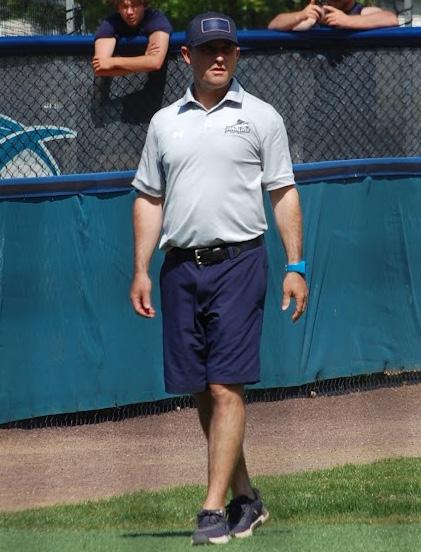
After Softball swept Eastern Mennonite University (EMU) on April 10, it was announced that Head Coach Brandon Elliot had achieved an impressive career record of 601-148-1, putting him 21st on the All Time coaches list.
When reflecting on this momentous milestone, Elliot admitted his goal as head coach was not to amass as many wins as possible, but simply to influence his players and better them.
“When I took the program over, I just envisioned myself trying to rebuild something here, and you don’t really have a goal in mind and how many games in your wins,” Elliot said. “But you just want to win championships, and you want to help kind of shape young people and influence young people. And I think over the course of my career, we’ve been able to do that.”
Remaining humble, Elliot recognized that he should not be the sole recipient of attention, as there are other stakeholders in
his success. “It’s a weird place because people are celebrating you, but you also know in your heart that this isn’t about me,” Elliot said. “There’s no way that I could do this, or be here without tremendous athletes, and a tremendous staff and certainly my family.”
Elliot also took the time to commend other VWU coaches that he admires. “I mean, I still look at David Macedo, and I look at Jeff Bowers. I just look at them as the GOATs, like they’re the standard,” Elliott said. Although Elliot is proud of this accolade and appreciates the gratitude that comes with it, he does not allow it to distract from his goal: to win championships. “Certainly cool, but when you’re in the middle of the season, it’s like alright, move on,” Elliot said. Elliot’s unwavering grit and commitment to his team has been the determinant of his success thus far and will ensure his success for the rest of his career. Elliot and the
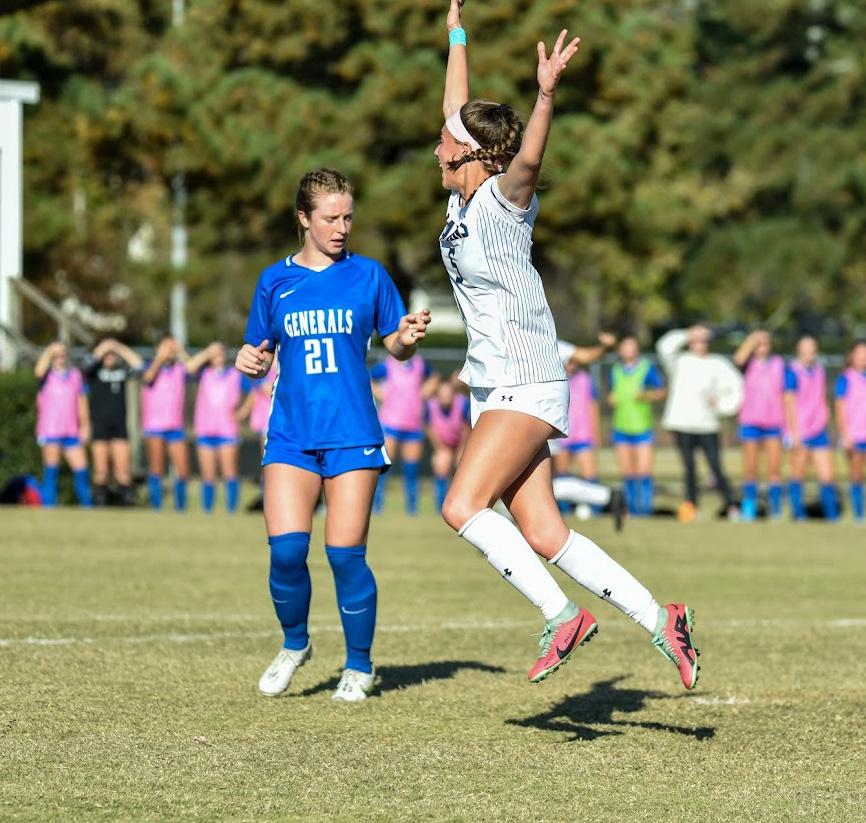
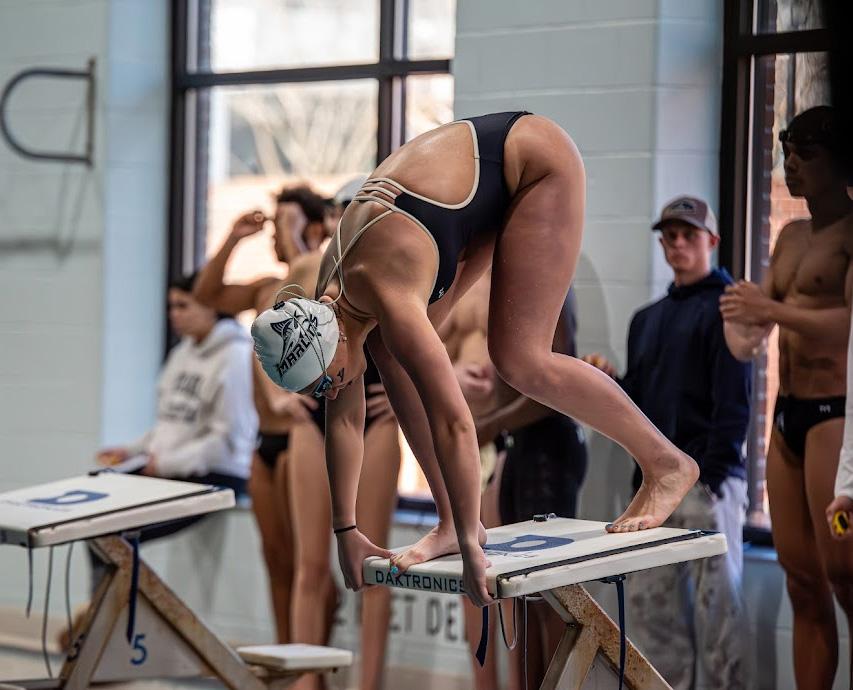
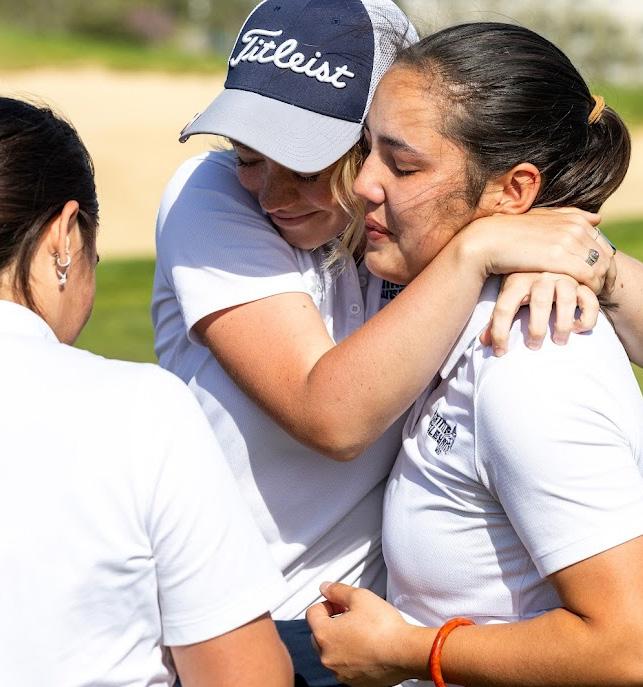

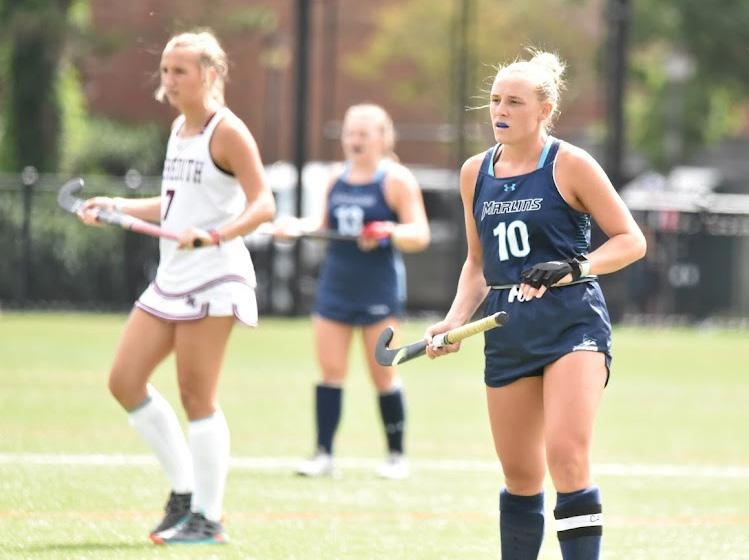
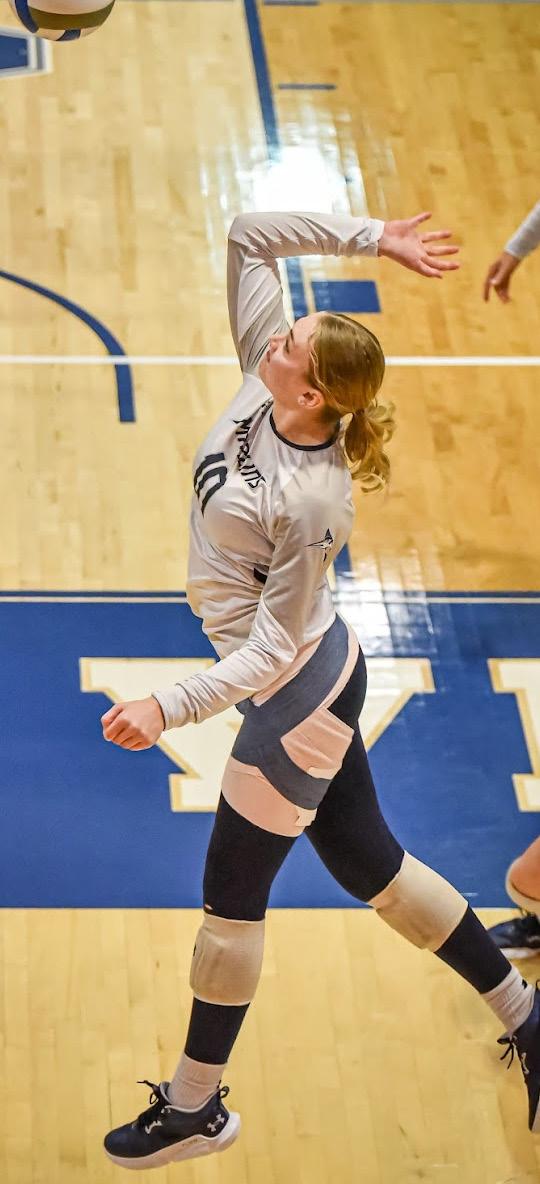
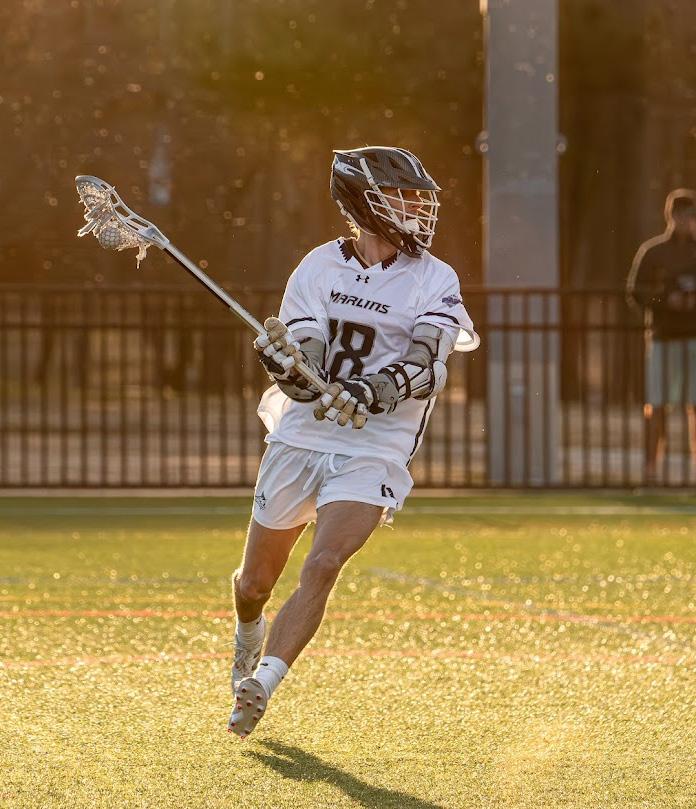
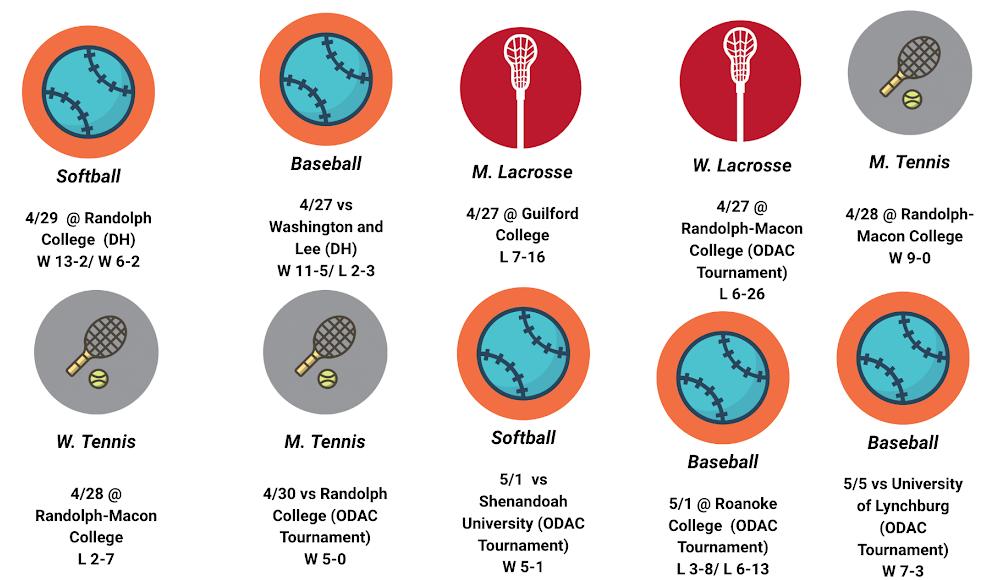
For the first time since the 2020-2021 school year, there is a full Golf team at Virginia Wesleyan University. This year, in his second full season as the head coach, Director of Men’s and Women’s Golf Tom Hall was able to recruit a full roster of firstyears from all over the world. In doing so, he picked up a remarkable talent, Juliette Coffey.
At the 2024 Old Dominion Athletic Conference (ODAC) Women’s Golf Championships, Juliette Coffey, a firstyear from Woodbridge, England won the individual golf title in a two-hole playoff against Emily Brubaker from the University of Lynchburg, the 14th ranked player in the country. During the three-day championship held in Blue Ridge Shadows Golf Club in Front Royal, Virginia, Coffey shot 77 on the first day, 78 on the second day and 75 on the last day.
Both Hall and Coffey were ecstatic about the win, although this was unexpected for Coffey, especially since she didn’t take the lead until the very end of the third day. “It was not what I expected to do my freshman year, but I am really happy that I did,” Coffey said.
Hall expressed his excitement in watching her win. “For her to accomplish this success in just her first year at VWU is incredible. There was a great sense of pride and happiness for her,” Hall said.
The journey to winning the title was difficult, as Coffey explained that she was not playing her best golf in the fall and had a specific goal for the spring season. “My goal for the spring was to shoot consistently in the 70s and for the most part I did that, but I did not believe I would win ODACs,” Coffey said.
Hall said Coffey has a great work ethic, commenting on the extra work she puts in on her own time. “She spends extra time in the simulator and on the putting green on her own,” Hall said.
Both Hall and Coffey know and hope that this win will bolster recruitment for the golf program, especially for the women’s team.
“This championship and the attention it has brought to the program is overwhelming. I am hoping that women from all over the country will want to be a part of the success of the program,” Hall said.
Coffey echoed similar words. “I hope that this will be something that draws in others to come and play at VWU in the future. It is definitely a selling point and maybe it will draw in some good players, so we can build a strong team,” she said. Coffey will not be on campus for the Fall 2024 semester, since she will be studying abroad. However, she does hope that she can improve throughout her college career, which would include a trip to Nationals. “When I get back, I will be excited to get back into it and improve,” Coffey said. Look to see if the Marlins can maintain this momentum and continue to improve as a whole in the fall and in the spring of the 2024-2025 academic year.
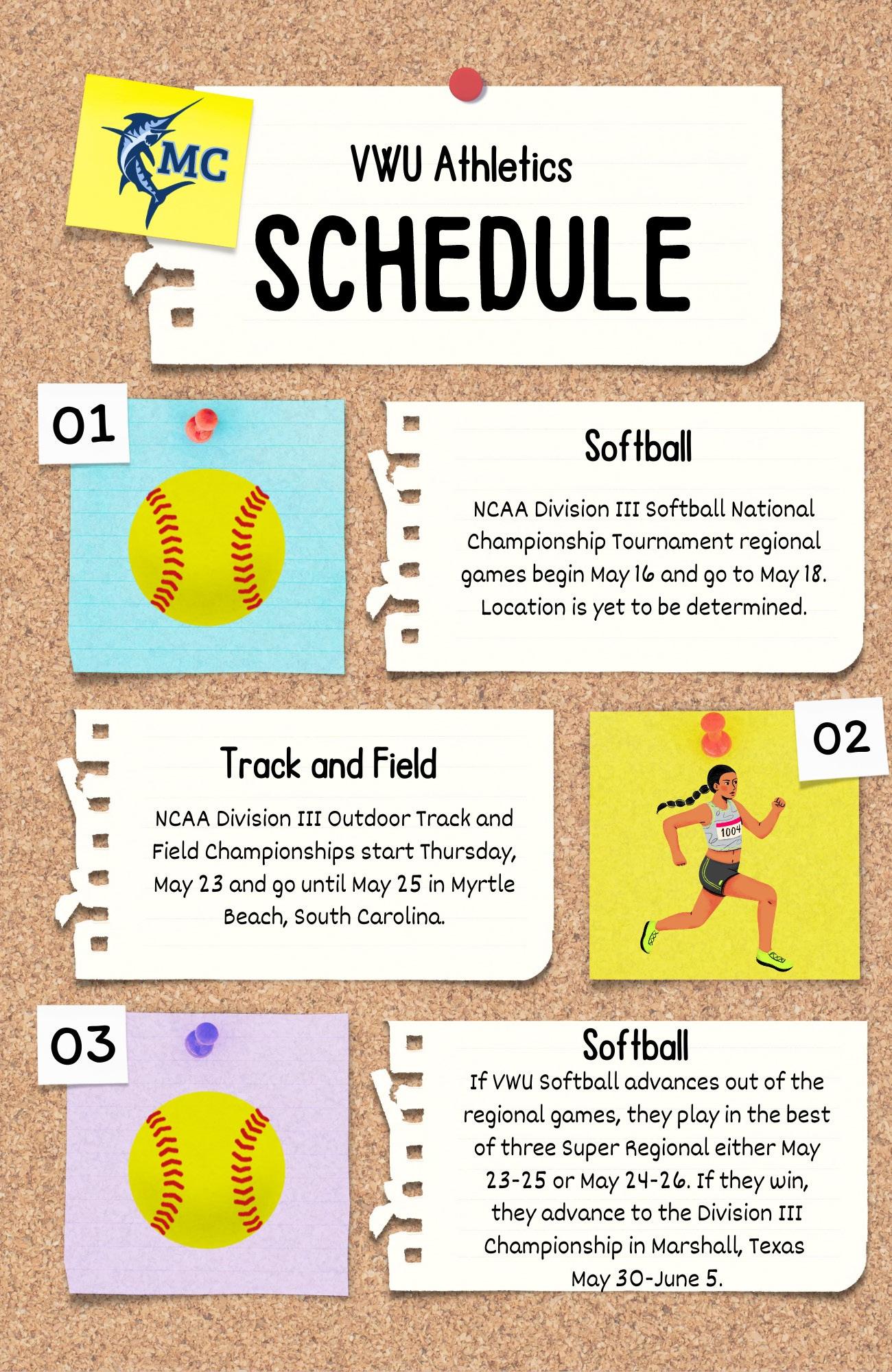

College students tend to find many ways to stay busy, and many do so with a job. Virginia Wesleyan has many opportunities to get a job on campus to help pay tuition, but there are also many opportunities in the local area to work and put money directly into your pocket.
Some students, like first-year Emma McCluskey, find jobs at restaurants. McCluskey works at Outback Steakhouse and has been able to find a balance between school and having a job. “I usually take care of all of my school work during the week and work on the weekends,” McCluskey said.
Going away on your own for the first time is a big challenge that college students face. However, knowing people in the area can help with the transition and with finding a job. McCluskey said, “my cousin recommended that I get the job,” but there are other ways if you do not know people in the area.
Connections aren’t the only way to find jobs. First-year Allyssa Mortenson works at the Cheesecake Factory. “It is my favorite place to eat, so I walked in and asked for an application,” Mortenson said.
Working while in school does have setbacks and limitations for some students.
First-year Haley Cummins, who works in the Enrollment Office as an Ambassador said, “Having a job has not affected my grades so far. However, I feel that if my class were more challenging, as I’m expecting in the future semesters, I will need to take less hours to balance it all.”
There is only so much a person can do in a week or a month, so learning how to balance work and school is very important. According to an article by the University of Pennsylvania (UPenn) Wharton Business School, “Compared to students who never work part-time or full-time in college, students who work every month receive on average 0.41 standard deviations lower GPAs.” This is based on working more than 20 hours a week.
The amount of hours students can work may depend on the program the students are enrolled in. According to UPenn, “For students who attend a two year program, almost two-thirds spend more than half of their time in college working twenty or more hours in outside employment.”
For students attending two-year schools,
UPenn said, “students who work every month receive 0.24 standard deviations lower GPAs.” The 20-hour per week mark should be able to serve as a little bit of a guide to students wanting to make money while being at school. The data shows that working under that mark makes it less likely for students’ academics to suffer.
Everyone is different, though. Part of moving away to college is figuring out what works best for each individual student, and working during school also has its benefits. According to CNBC and research conducted by The Bureau of Labor Statistics, “Students who worked less than 20 hours per week had an average GPA of 3.13, while non-working students had an average GPA of 3.04.”

The same research found that “working a moderate number of hours has been shown to help students perform better in the classroom, working too much has been shown to have negative effects.”
Most students just want to have a little spending money while at school. Working a small amount of hours is worth it to students. “I like being able to make money while being at school,” McCluskey said. This can help students do things off campus with their friends and attempt to make college a better experience.
Knowing what you are capable of is a large part in taking the next step in your career. It may take a little time to figure out time management, but that is what being a college student is all about. There are benefits of working even if it may not be full time. For students who feel like working is not worth possibly letting academics suffer, then saving money during the summer might be all they need.
Diverse Asian treats have made their debut in Virginia Beach just fifteen minutes from Virginia Wesleyan’s campus. Oh Mochi, co-owned by business partners Jay Choi and Brian Yoo, has flourished since its opening in February 2023. Mochi donuts, made-in-house, are crisp and chewy pull-apart rings, delicately decorated with frosting, cookies or chocolate scrolls. Reliable flavors, such as Belgian chocolate and creme brulee, mingle with classic Asian staples and inventive rotating flavors like taro and lemon berry.
Oh Mochi’s made-to-order Korean corn dogs are unlike their American counterparts and are well worth the wait. Gooey mozzarella or beef hot dogs are battered and fried, optionally covered in crunchy chunks of potato and sprinkled with sugar for balance. Customers frequent the storefront, leaving with hands full of boba and boxes alike.
The business has never tailored their menu to a demographic and instead unabashedly wields creative flavors and Asian cuisine. “The idea is to cater to a diverse palette and a diverse group of customers,” Choi said.
Junior Adam Sterling had a strong opinion of the store.“It’s a nice place to get your day started and if you want to try something new. Very flavorful food, especially the potato mozzarella rice hotdog. The only downside would be the boba,” Sterling said.
Senior Erika Eichelberger has visited the store a few times. “It is a great place with an excellent atmosphere. The corn dogs and donuts exceed expectations,” Eichelberger said. While the general consensus might be that the boba is overpriced, Oh Mochi does produce treats worthy of a return trip.
Yoo and Choi began their journey as a part of the Mochinut franchise. However their decision to branch out and rebrand became a reality when they began to disagree with Mochinut’s price control and sales ideas. Yoo, with a degree in hospitality, initiated the separation. “He was actually the founder of the business and when we rebranded, we rebranded together, so Oh Mochi is kind of like our baby,” Choi said. Three years ago, their Richmond location debuted and met with success.
In August 2022, the partnership decided to add a location in Virginia Beach, but their progress was met with unanticipated obstacles. Oh Mochi was forced to rebuild their storefront from the ground up and delay their grand opening due to disgruntled previous tenants sabotaging the electrical work. Regardless of the circumstances, Choi’s mindset has been nothing but positive, kind and growth-oriented. “[You] can’t alway get your way in life, you always have
to improvise and adapt,” Choi said. Now, the storefront is dripping with the small business’ charm. Bright colors, custom murals painted by a team member, neon signs, cases of endless donuts and uber friendly baristas create an accessible user experience. Oh Mochi is excited to grow roots in the area and possibly partner with other small businesses.
Choi, a Virginia local, had no idea his career would lead him into such a successful business in the food industry. He began his professional career working with satellite software, but “between corporate jobs and even in the evenings with corporate jobs, post college, I always served as a bartender or at a restaurant,” Choi said. He knew that one day he would own his own business and through hard work and dedication, he has achieved his goal with the help of Yoo. “Brian and I are such different people and for that reason it’s been great, we have a very synergistic business partnership,” Choi said.
The team eagerly translates their energy to their staff, who manage a monthly beverage menu that experiments with new flavors and reflects trends. Oh Mochi is currently hiring proactive individuals, and will accept part-time employees. The storefront is located at 4224 Virginia Beach Blvd., Virginia Beach and is open every day of the week from 11 a.m. to 8 p.m. If you’re ever in Richmond, Oh Mochi just recently opened their second location in the city and has plans to expand nationwide with the help of their team of general and assistant managers. Weekender highly recommends Oh Mochi for a sweet treat or study break snack.


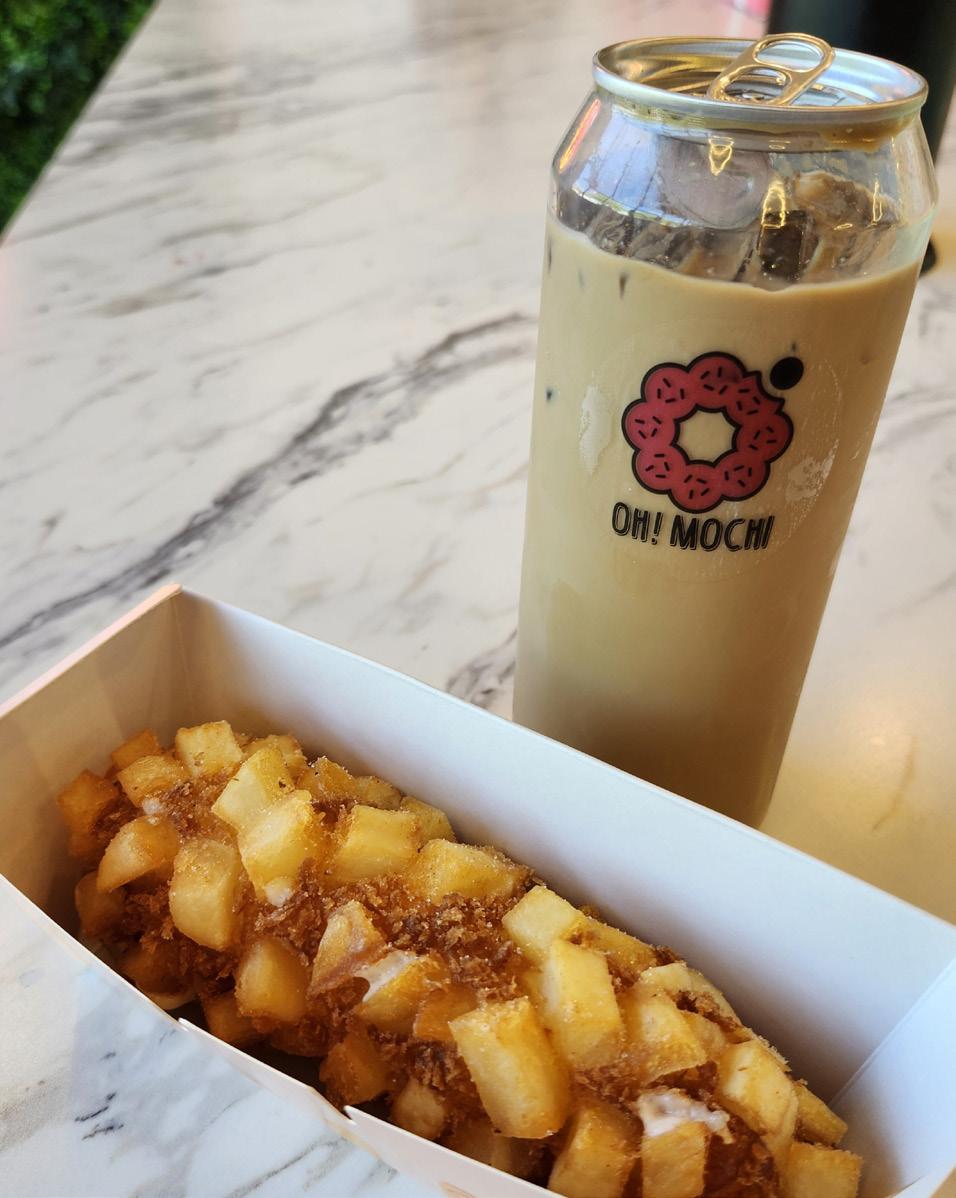
The Violent Youth Fest, a backyard heavy music festival, was full of great bands, energetic crowds and WWE type stunts.
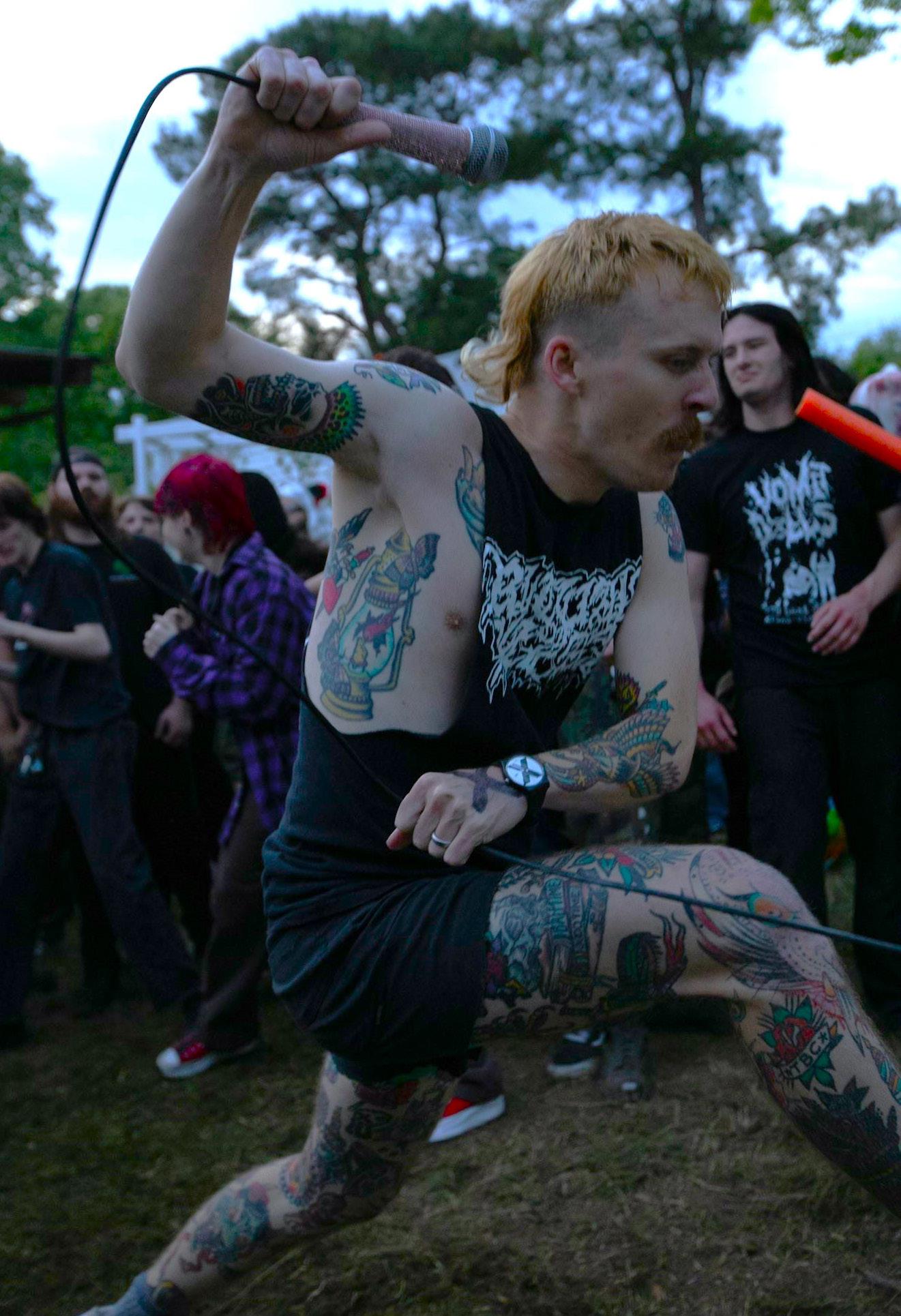
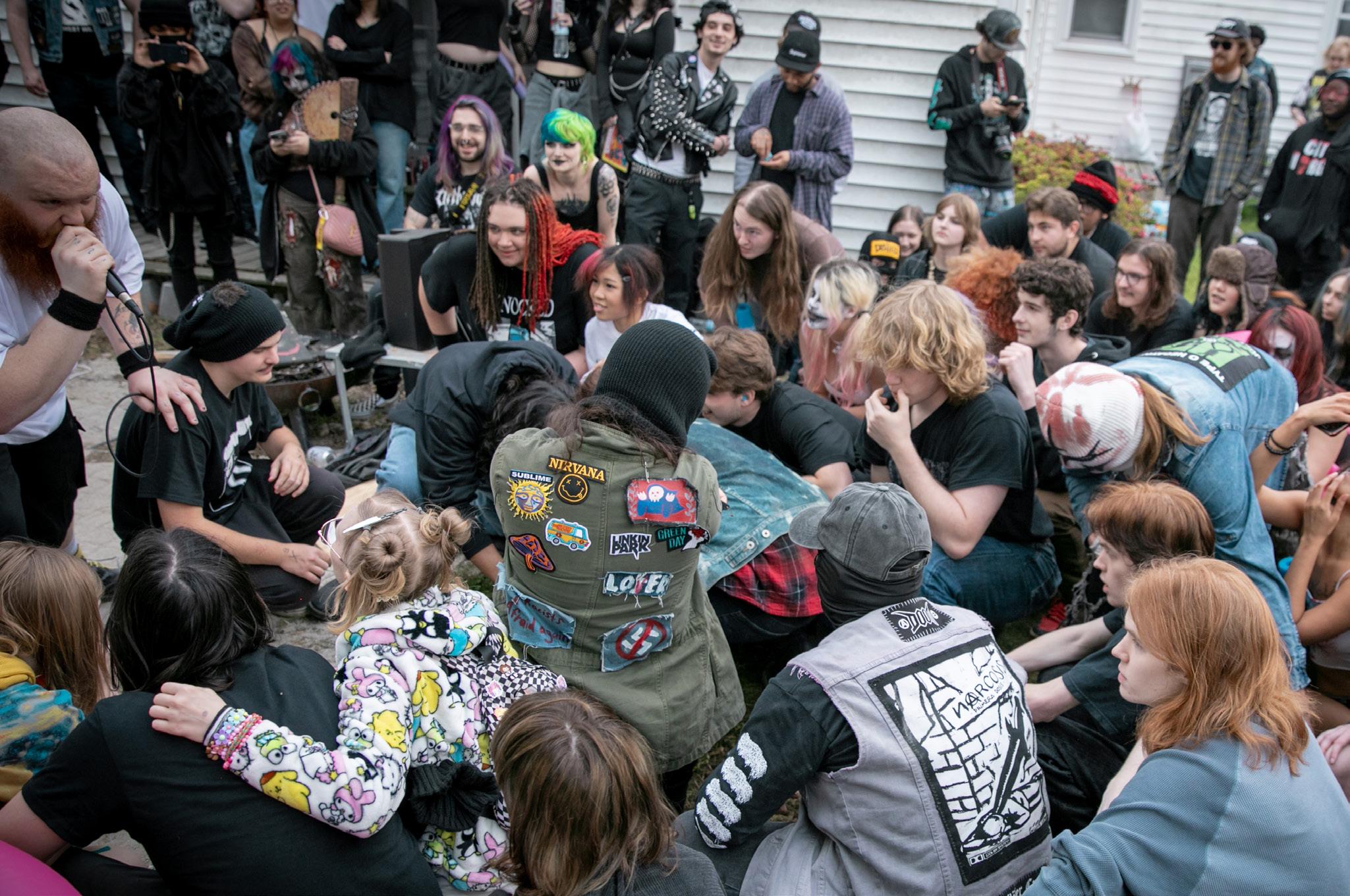 BY AIDEN CROGHAN accroghan@vwu.edu
BY AIDEN CROGHAN accroghan@vwu.edu
Blood pumping, bodies dancing, kicking and shoving through the mosh pit, all while avoiding kicks and shoves from others as bands wage a sonic assault on attendees.
Violent Youth Fest, a backyard doit-yourself heavy music festival put on by Violent Ways Booking, occurred on April 27. The festival was headlined by a local band, Arm The Youth, in a farewell show before their lead singer ships off to boot camp. The fest’s lineup of bands included touring bands: Vomit Dolls from Massachusetts; K-HOLE from Buffalo, New York; Reviler from South Carolina; and Death Mask from Richmond, Virginia, as well as local bands Brutal Jab, Fupa Goddess, Sick Of Dying, Alpha and Arm The Youth. The festival was sponsored by Destroy Zine, a magazine that focuses on hardcore punk and counterculture, who vended products at the event.
The first band was Fupa Goddess, who started with a heavy yet comedic set. Fupa Goddess played a fun-focused blend of grindcore (a heavier, faster and more metalinfluenced subgenre of hardcore punk) and death metal. Between each song was a clip from the show “Seinfeld,” which added an extra element of humor to the band’s set.
The next band was Brutal Jab, who delivered a beatdown of metallic hardcore. The band’s sounds and energy incentivized a mosh pit of slam dancers and created an intense atmosphere that would persist for the entire night. After Brutal Jab came Sick of Dying, who delivered grinding fastpaced punk that kept the energy going and the crowd moving.
At some point during the barrage of sound, pool noodles and inflatables were brought in and firecrackers were set off, which added extra layers to the already chaotic mosh pit. Tables were used to launch stage dives and to bounce back into the mosh pit for extra force to push through to the other side.
Next in the lineup was K-HOLE, whose militant sound ripped through the audience with their frontman joining in the moshing as well. Death Mask immediately followed up K-HOLE and continued the sonic destruction with a familiar, heavy and beatdown sound.
After Death Mask came Vomit Dolls who performed their furthest set from home and played a noisy, fast and grinding beatdown sound. They prompted the audience to circle the pit and brought in many more of the crowd members to join in on the mosh pit. The band brought in one of their roadies to join in on the set, who first played a homemade instrument which he blew into the microphone, and then lifted the lead singer onto his back.
Following Vomit Dolls was Alpha, a local punk band with a wide array of influences, from hardcore to folk. Their set looked more like a WWE death match with a live band than it did a traditional live band set. As they opened their set, they brought out a TV and instructed audience members to destroy it with bricks, to which the audience obliged, and destroyed it with the bricks and kicked it in.
Following the TV destruction, the band brought out folding chairs with their band logo written on them and their vocalist, Austin, slammed them into his head. Following this, audience members started asking Austin to hit them with the chairs, which created a line of people being smacked by folding chairs as they cheered.
After this, Austin brought out a folding table and covered it with thumbtacks. Audience members then began body slamming the table and throwing each other into it, Austin eventually joined in. Then, Austin proclaimed that he was going to slam into the table and that audience members did not need to take it upon themselves to destroy the table.
Following this and a quick collective clean-up of the tacks, Alpha ended their set with two covers, first “Bodies” by Drowning Pool, and then finishing the set
with a heavy cover of “Rebel Yell” by Billy Idol.
“So I grew up with, like, what was that, ‘Attitude Era WWE,’ ‘ECW,’ I remember watching bumfights, and MTV, we watched ‘Jackass,’ ‘Viva La Bam,’” Austin said on what influenced their very theatrical set.
“These stunts look fun [...] eventually I think I thought about becoming a pro wrestler type thing, but then I just didn’t know how to get into it and I didn’t know anybody, but then I just pursued art. I’ve always been into art.”
The final touring band of the night was Reviler, a heavy straight-edge hardcore band from South Carolina. They encouraged heavy crowd participation and called for stage dives and crowd-surfing and moshed with the audience.
The grand finale of the festival, and the band’s own final show in its current form, was Arm The Youth. The band played an eclectic blend of straight-edge hardcore and anarcho-punk, infused with progressive Christian ideals.
“I’m not going to speak for everyone in the band because we started out and we had different conversations about what we think Jesus was like. Personally, I think me and Chris [Arm The Youth’s guitarist], we agree on the same thing. We think Jesus was an anarchist and we generally think that if Jesus were here today, a lot of people that worship him wouldn’t like him,” Carter, the band’s vocalist and primary lyricist and leader of Violent Ways Booking, said.
The band also has a wide range of musical influences. “I was more so into metal stuff, like black metal in particular,” Chris said. On his influences before joining Arm The Youth, he said, “Playing in a punk band got me into punk.”
The band’s drummer, Ivan, came from a different musical background. “I come from a jazz background, so I kind of want to infuse some of those different types of drum beats and stuff like that,” he said.
The band’s bassist, David, was newer to the band than other members. “I wasn’t
really here for the writing of the songs, I just joined and was told what to play. For me personally, I really like just seeing people move and having our music cause people to just go crazy in the pit, it’s just a cool feeling to have.”
Arm The Youth’s set was energetic, and included hard-hitting new material from the band, including a track called “Dogs With Teeth” which includes one of Carter’s favorite lyrics: “You think you’re better than me, but I can see you’re at rock bottom, and we’re both looking eye-toeye.”
Their set was incredibly energetic and culminated in Carter vomiting after thanking the audience for the night.
The venue of the show is called Sanctuary House, which is a house venue operated by Raymond Marquis. House venues have a reputation for shows getting shut down following noise complaints; however, Violent Youth Fest faced no issues of this kind.
“We functionally invite all of the neighbors, we put out flyers to all of them that tell them like when we’re starting music, when we’re stopping music, and tell them that if they’re interested they should swing by, and I think it’s a lot harder to get mad at a party you’re invited to,” Marquis said on how issues were avoided.
The festival was a hit with attendees, those both new to hardcore and established community members. For one attendee, James, it was his first show. “I’ve never let loose like that,” he said.
A more seasoned show-goer, Natalie, spoke on her experiences with hardcore. “If you don’t fit in, this is your place,” Natalie said.
Violent Youth Fest ended the night of energy with a calm bonfire and free hot dogs for all attendees. As friend groups reformed and people tended to their moshpit injuries, the chaos died down for the night, ready to start again another day.
